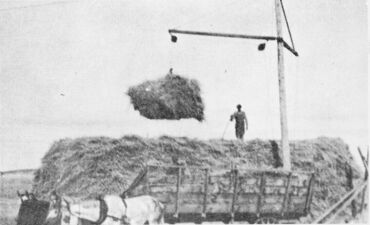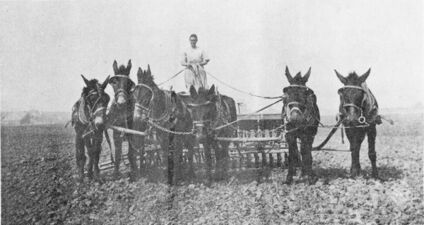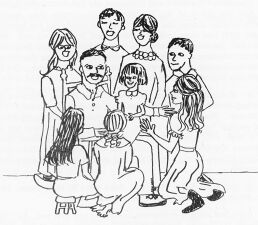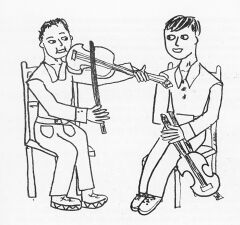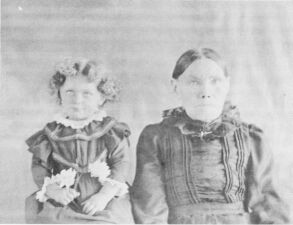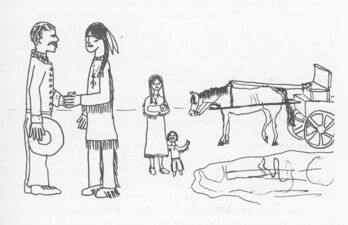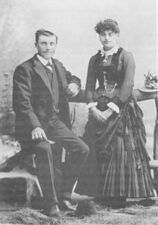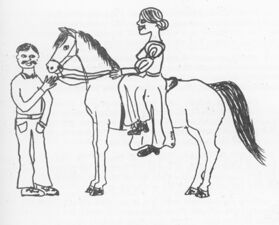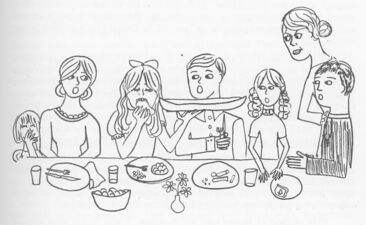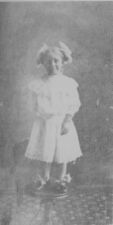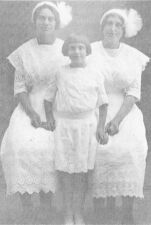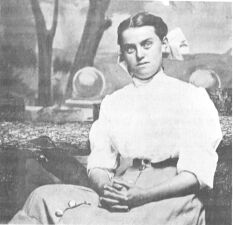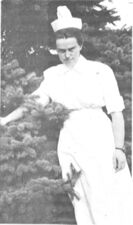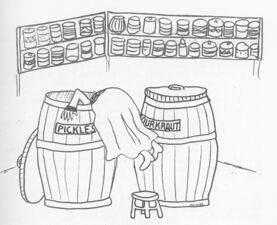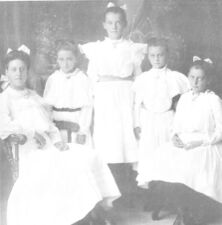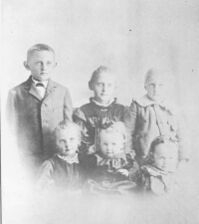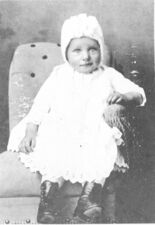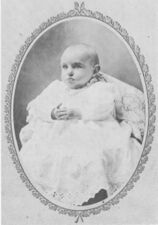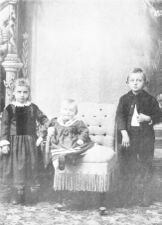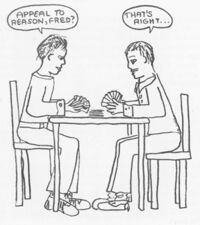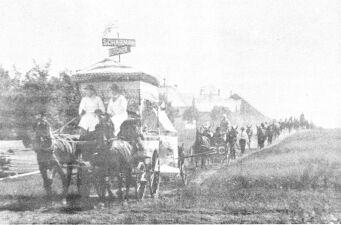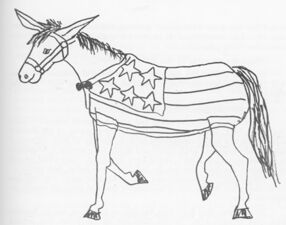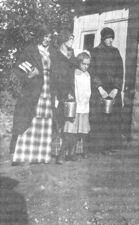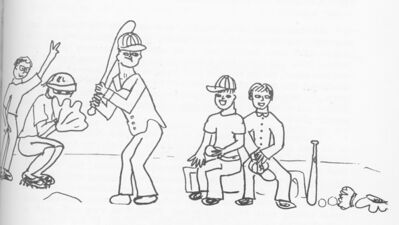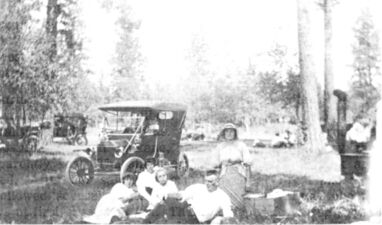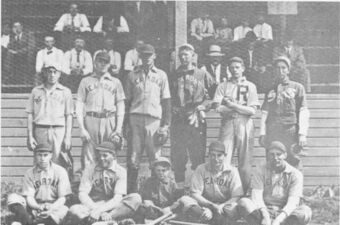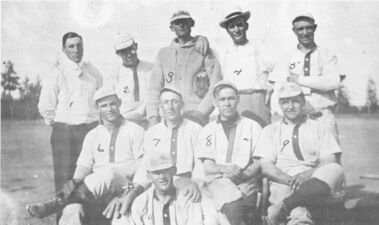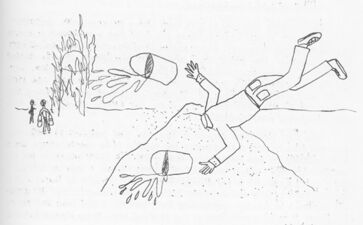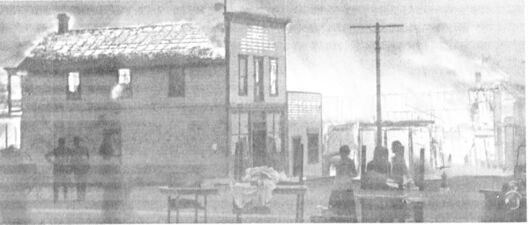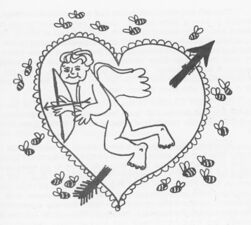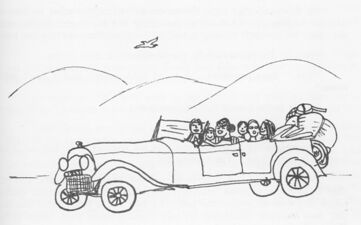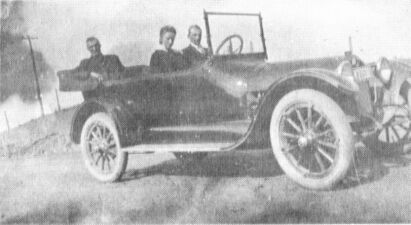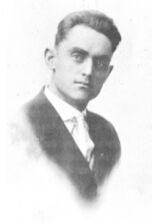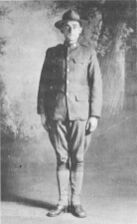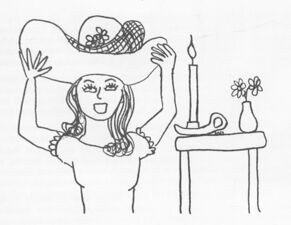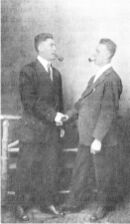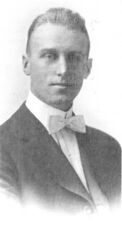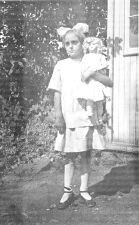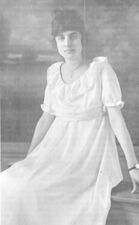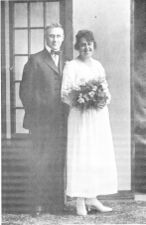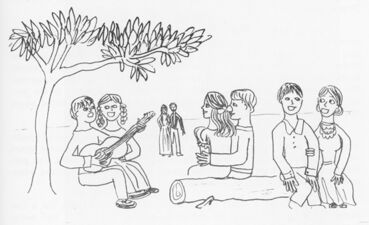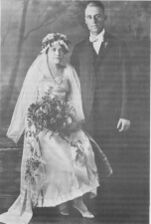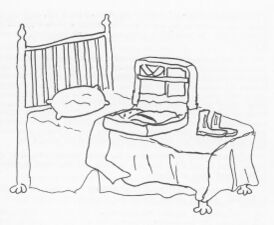Without a Little Teamwork
[This is family memoir by Margret Clare Wagner Johnson, the youngest daughter of Fred and Lena Wagner. The sketches for each chapter are drawn by Janeth Nash, the author’s granddaughter. Copyright 1972 All rights reserved.]
Spelling and typographical errors have been corrected. Page numbers mark the bottom of the original pages. Photos may be enlarged by clicking on them. The image of a particular page can be accessed by clicking on the Page box on the right had side of the page. All photographs and drawings can be accessed at Without a Little Teamwork Photos. The sequence of page images can be accessed at Without a Little Teamwork Pages]
CHAPTER ONE: The Rich Story
It was an evening in June, supper was over, the dishes washed and put away. Although the big clock on the shelf in the dining room had shortly struck eight, the light outside was still radiant. A few cumulus clouds in the west caught the afterglow of the sun, changing from coral to rosy red to violet. Down by the lake the usual medley of noises, the night hawks beeping, the killdeer plaintive and the blackbirds strident. Co-mingled with the bird calls, the frogs croaked a leisured obligato while in the scab rock above the lake coyotes had started their incessant yelping.
The Collie bitch hearing the opening of the front door, came bounding up to receive an affectionate pat from Papa. Together they made the last final round, closing the chicken house door securely against marauders, checking a mare soon due to drop her foal and closing the granary doors. Then Papa walked up to the road to watch Herman and Gus playing catch. The baseball season had started again.
“How much longer will it take you to finish plowing the half section?” asked Papa as the boys finished their nightly workout.
“Another ten days should do it I should think,” answered Gus. “There’s a lot of moisture in the ground. Good for the wheat.” Page 2
Upstairs in the two front bedrooms the girls were getting ready for bed. Lou the oldest of the Wagner girls was more than ready. Since Mama’s lengthy illness, the responsibility of caring for the house and the younger girls had been largely hers. It had been a long day. How good the bed felt. Bertie, who shared the bed and bedroom with Lou, was standing at the windows watching the boys for a moment as she brushed her long hair. Instead of going directly to bed she went down the hall and slipped into bed with Minna and Rose.
By choice Anne, Minna and Rose shared the big southeast bedroom so the smaller one over the kitchen could be used for a study. I was Anne’s charge. She had been so delighted when Mama unexpectedly produced another baby. I was her joy and delight. When I was too old for a crib, I slept with Anne. Once in my sleep, thrashing about from some frightening nightmare, I had rolled out onto the floor. Thereafter Anne put down pillows by my side of the bed so if it happened again I wouldn’t hurt myself.
At this time Anne, Bert and Rose were in their teens, Minna not quite, while I was seven years younger than Minna.
Anne had already gotten me undressed and into bed. As I lay under the covers my fingers traced the patches of the quilt. Mostly the patches were dull in color, wool and practical, but they were made a bit more gay with bright colored embroidery. They were scraps left over from the yearly stint of clothes making. The blue plaid with red feather stitch was from Rose’s Sunday dress, the brown homespun in cross stitch was Minna’s. Mama taught the girls their embroidery stitches on these quilts at the same time as she made practical use of the leftover bits of fabric.
Lou was the perfectionist and you could always recognize her work for its flawlessness. Anne finally crawled in beside me, drew me into the sheltering circle of her arms. The nightly episode of the “Rich Story” was about to begin.
If you asked any of the girls to define rich, they would say, “Why, you silly, to be rich you have to have lots of money.” That we were rich in love, security, happiness and laughter they all took for granted. Who started the “Rich Story” I have no idea. At the time I was too small to have more than just vague memories about it, but I am sure the story provided entertainment for the girls for months.
The plot of the “Rich Story” was of the simplest. The Wagners had an unlimited amount of money. Each girl in her turn contributed her imaginative bit to the ever recurring theme, as the family moved from one adventure to another they were always surrounded by an endless amount of money.
“Anne, its your turn tonight,” said Rose.
“Yes,” chimed in Minna, “its your turn to tell tonight.”
Bertie anticipating the story added, “Now, Anne, what exactly happened to Donald and Dorothy.”
In the story Lou was married and the mother of twins, Donald and Dorothy. Anne’s great love of children necessitated her need to introduce them into the plot. The twins recurrently were thrown from runaway Carriages, were bedridden with malignant unknown diseases or other catastrophes so Anne could tenderly nurse them back to health.
“Well, let me see.” On and on her voice rose and fell in rhythmical cadence as she developed her plot.
Finally Lou called out, “You kids be quiet in there. Its time for sleep.”
Reluctantly Bert returned to her own bedroom. “Don’t you dare whisper and tell any more after I’ve gone.”
Papa was a past master at telling stories. His sense of timing, showmanship and suspense made even the simplest tale sound exciting. He would sit in the rocker after supper and the eight of us would gather around him eagerly listening.
After Mama died in the summer of 1911, Papa formed the habit of at leaving the ranch sometime in the late fall, traveling to California to see and visit with his brother Charles and then on to San Francisco where he took an apartment until early spring. I was never sure he was leaving until I saw the battered brown suitcase come out from under the bed. It was more than ample for his modest needs, extra long underwear and trousers, a half dozen pair of socks, three or four striped shirts and perhaps a celluloid collar. For safety sake he sewed a money pocket to the inside of his long underwear. He kept an account at the Bank of California, but he carried with him the cash needed for each season.
On the day of his departure his work clothes were neatly arranged in the closet. Papa would go to the bathroom, grab the razor strap, hone his strait edged razor for an extra close shave to last until San Francisco. Normally Papa shaved about once a week unless he had business in Reardan.
For dress up occasions Papa’s suits were always serviceable black serge, usually purchased from Miller, Moore and Flynn department store in Spokane. He favored the Congress slip-on shoes of vici-kid with elastic insets. They felt as comfortable as slippers which was important to Papa Page 4 as he was troubled quite a bit with his feet as he grew older. I don’t remember ever seeing Papa wear a top coat, but he was well padded with long underwear during the winter months.
Last minute talk with Gus about farm business and winter repairs, talk with Lou regarding the household and then the rest of us were lectured on how we should behave while he was gone ending up with, “Be good, mind and help Louise.” If the weather was inclement, Gus would harness Mollie and hitch her to the buggy so Papa could have a ride into Reardan. In fair weather, however, Papa preferred walking in by himself. The train from Hartline to Spokane stopped briefly in Reardan about ten.
“Morning, Fred. Ticket for Spokane? Oh San Francisco. Guess it is time for your yearly trip down there.” The agent and Papa exchanged pleasantries until the steam train whistle reminded them of business at hand. Two hours it took for the train to travel the twenty-five miles from Reardan to Spokane as the line detoured at Deep Creek to offer service to Cheney.
The Northern Pacific bound for Portland left Spokane at eight P.M. Papa always traveled by coach. He denied himself all but barest of essentials in order to give more to his family. The trip south was not too unpleasant as there were always plenty of fellow passengers with whom Papa could visit. After a short lay over in Portland, he caught the south bound train.
For a number of years Papa had a small apartment on Mission Street in San Francisco across the street from the old U.S. Mint. He was happy there with his quarters and his location. Not too far away on Market Street was the Crystal Palace Market where Papa did much of his shopping. He was particularly fussy about his meat. As a little girl I thought living across the street from the Mint was the most glamorous location in the world. Papa toyed for a while with the idea of purchasing the apartment building, but instead he finally settled on more wheat land in Lincoln County.
I’m sure there wasn’t a single motion picture theatre on or near Market Street that Papa did not attend. He loved the movies and went when ever there was a change of pictures. Westerns were his favorite and he enjoyed lots of action. After every performance Papa would come back to his apartment, take down a little black book, jot down the story briefly so he could refresh his memory when he got back home.
What did Papa do to entertain himself during the months he spent in San Francisco? He was always so active physically when he was at home that he probably enjoyed the months of leisured activity. He walked a great deal so that through the years he gained an intimate knowledge of Page 5 many sections of the city. Papa never missed a band concert on Sunday afternoon at Golden Gate Park. He played quite a lot of pool and of course always the movies. There were several retired sea captains from the merchant marine with whom he became intimate. They spent hours telling each other their adventures and then almost daily there was a pinochle game in which Papa would make a fourth.
Papa usually arrived back in Reardan without any advance notice. He would get off the four o’clock train and walk home. Seldom did he get over the brow of the hill without someone spying him and calling out the welcome news, “Papa is home.” How happy we all were to see his beaming face. One time, however, he had shaven off his mustache and I cried when this strange man tried to take me in his arms and call me “Die kleine Christina.”
Each year after Papa went south we learned to wait for and expect two parcels. From Sebastopol came several gallons of strained honey, then shortly thereafter a hundred pound weight of walnuts. The walnuts were kept in Papa’s closet. How great they tasted with big bowls full of apples, or in the batches of candy. I thought they tasted especially good when I filched them from the very large sack in the closet.
It was in the spring, however, when Papa returned that we received the best eating treat of the year. This was a big double crate of navel oranges which Papa checked through as part of his baggage allowance. I was his willing helper as we arranged eight neat piles on the dining room table. “Mudge, Minna, Res-la, Bertie, Annie, Lulu, Hammie and Gus,” I chanted over and over as the piles grew larger and larger until the crate was empty. Papa never ate any himself as he always said, “I get plenty of them in San Francisco.”
Each one took his special pile of fruit to his own secret hiding place. Each decided his own rate of enjoyment, some like me greedy to savor and relish in an incredibly short time, others like Lou spreading out the taste thrill as long as possible. It was only once a year that we had oranges to eat. They were too expensive to buy in Reardan or Spokane. Occasionally for the Fourth of July picnic Lout might buy an orange and a couple of bananas to all to the other fruit in a gelatin fruit salad.
I loved to hear Papa talk about the big Orange Fair in Cloverdale. Every few years Papa and his fried Captain Wieprecht would take the ferry boat to Sausalito where they caught the Northwestern Pacific train for Cloverdale. They could go up in the morning, see the exhibits and catch the evening train back. This trip was made sometime in February when the oranges were ripe.
The first night Papa came home signaled the beginning of our story telling sessions. After supper we all gathered in the dining room. The Page 6 kerosene lamp shed a puddle of soft light on the surface of the table while the corners of the room held dark mysterious shadows. Some sat at the table, some on the corner couch while others relaxed on the floor near the fire. Papa found himself comfortable in his favorite rocking chair. While we all waited with eagerness, Papa scanned his little black book.
Most of the stories Papa told were those he had seen in the movies. If they were not dramatic enough to suit his taste he would embellish the plot as he went along. Many movies were made from Zane Grey’s novels so I am sure we heard these tales. Most of Papa’s stories had very little of sex or love in them. If there was a girl involved in the plot it was in a very minor role. The big thing was action, blood and thunder tales of cowboys and Indians pitting their strength against bandits and outlaws.
Papa always used the German language in telling his stories to us children. I think he always found German a more comfortable language as it offered him greater nuances in tone and color. Sometimes when I was still quite small, I would be so frightened by the events of the story that Anne would have to leave in the most exciting part to put me to bed. Sometimes I fell asleep before the story session was over. Then Papa or Gus would carry me upstairs to bed where I would find myself in the morning and wonder how I ever got there. By the beginning of the First World War the rest of the family had grown beyond the stage of story telling, but I was Papa’s audience for several more years.
Books and stories — books and stories. They were the leavening that raised our busy work-a-day lives into a wonderful shared pleasure. Whenever any sit down kind of group work needed to be done, out would come the latest book we owned. One of us read while all the others kept fingers busy.
When we were growing up the amount of detailed work involved in the preparation of food was prodigious. From late spring until early fall there was an endless procession of food to be processed. First came the red currants to be picked and made into jelly. Then for pies and for sauce we canned gooseberries, strawberries and cherries. At about the same time the first of the garden produce needed to be taken care of. Garden peas, three or four large wash tubs filled at a picking, had to be shelled and canned immediately. After the Fourth of July the Gravenstein apples were ripe. Bushels of apples from our three big trees were peeled and made into sauce. String beans, corn, tomatoes, plums, peaches and pears came on later in the summer and early fall. The shelves in the cellar became more and more crowded with filled half gallon jars ready for the coming winter. It was not unusual to have six to eight hundred quarts of produce stored away.
Because of severe winter conditions, we were not able to raise our own peaches. Usually in September after school started, Lou and Papa Page 7 would make the yearly trek with horse and wagon to Peach, a little hamlet on the Columbia River. They would be gone for two or three days to pick and bring back several hundred pounds of peaches which were then laid out on newspapers in the upstairs study to ripen. Every few days enough would be ready for a canning batch. In the meantime we all had our fill of the fresh fruit. As soon as I got home from school and had changed my clothes, I’d select three or four ripe peaches, peel and slice them into a large bowl. I’d top this with cream so thick it had to be spooned out of the crock. It made a dandy snack before it was time to bring in the cows.
Getting the food ready for the table or for canning was usually done on the front porch with its protective roof. Often a faint breeze came off the lake making this spot the pleasantest place of all to sit and work. Sometimes we gossiped or visited, sometimes we harmonized in song, but if there was a new book in the house, one of us was spared from work y to read aloud for all of us to enjoy.
I guess Mama started the tradition of reading aloud while hand work or was done. The idea of education and culture was never out of her sight. While she spent so many years of her life in poor health and was limited in her physical strength, she always found time and energy to read aloud to us.
There is for me a vague memory, a sort of half shadow tactile one. I am perhaps between three and four years old. Mama is propped up on pillows on the couch in the dining room. I am lying at her feet listening to the musical cadence of her voice which seems to wash over me in gentle happy waves. Would the girls have been embroidering on the patches for the quilts? Perhaps.
Long after Mama was gone I found in Papa’s closet a book of German fairy tales, entitled “Lena Fafer.” The German script I could not read, but I enjoyed the pictures and Lou used to tell me the stories.
Reardan had no kind of a library. The books we read were the books we owned. At Christmas time there was always a book for each of us of one sort or another. The story about a horse “Black Beauty” and about a dog “Beautiful Joe” were two of my treasured gifts. I cried over them both for years. Aunt Barbara and Uncle Joe lived a scant quarter mile from us on the Erdman place. Uncle Joe sold bibles and religious novels. Surely some of his stock that proved to be poor sellers were passed on to us.
Probably Aunt Barbara gave me several of the Elsie Dinsmore books. Elsie was a young girl endowed with modesty and saintly virtue. On one occasion, in one of the stories, Elsie’s father gave her a new velvet a bonnet and velvet muff. She put on the bonnet, admired herself in the mirror Page 8 and stroked the muff enjoying its sumptuous texture on her skin. Suddenly she recoiled from this devilish temptation of pride and thrust the gifts aside. On Sunday as she and her father were leaving for church, he asked her why she was not wearing the new outfit. “Oh, I cannot,” she replied, “I will be thinking about my bonnet instead of God.” I read these books with relish, but I was never tempted to follow in her footsteps.
Another book of mine, religious in content, was “St. Elmo.” Elmo came from a very affluent family. He was pictured as a rake and a sinner in every conceivable term for about three hundred pages. In the nick of time, however, he changed his evil way and became a minister. More than once after reading St. Elmo I considered joining the foreign missions our church was always talking about, but somehow I always managed to change my mind. The thought of leaving home was more than I could bear.
There was one other book that I probably read weekly during the time I was about twelve. It was entitled “A Young Girl’s Wooing.” Many a time Lou would call me, call me and call me to gather the eggs, fill the wood box or do some other chore, but if I were safely hidden in the apple trees or out in the granary, I could ignore her calls and continue the story. The plot involved a dear sweet gentle young maid who out-maneuvered an unscrupulous rival for the love and affection of her brother-in-law’s brother. In all possible situations the heroine excelled in her bid for the young man’s affection. The rival sang Verdi with much aplomb so our gal took secret voice lessons until she could polish off Wagner arias with the greatest of ease. I think the final episode that clinched the romance was when the young girl saved the man from financial ruin when he was caught short on the market by putting up her own securities as collateral. I had no idea at the time what being caught short was all about, but it sounded impressive.
Bertie probably brought home “The Scarlet Letter” and “Little Women” which she must have purchased for some of her English classes. Most of Jean Stanton Porter’s novels were around the house for reading and rereading. When Herman married Martha Knudsen, she brought to their new home a complete set of the novels of Alexander Dumas. That was a real windfall for me to have access to so many books at once. Martha was very generous in allowing me to take them home for reading, one at a time.
CHAPTER TWO: Early Boyhood
We really know very little about Papa’s background. When he finally came to Washington, took out a homestead claim and became a United States citizen, his life, work, attitudes and thoughts were of the present and future, not the past. When I contracted smallpox in July of 1916 and Papa and I were quarantined for a month in a tent up by the spring, he concentrated his time and effort to keeping me happy and alleviating my homesickness. We walked for miles in the warm sunshine checking the ripening grain, sitting above the lake to spy on the house we could not return to and watching the traffic on the county road. To amuse me Papa often sang in his clear baritone voice. When I tired of this he would turn to story telling. I especially enjoyed hearing about his life back in Germany as a boy so he talked quite a little about it.
Papa left Germany sometime in his early teens, sent to a relative or acquaintance in Oshkosh, Wisconsin to learn the baker’s trade. About the time he was eleven Papa became a rebel. He enjoyed the basic mechanics of learning, the math, reading and writing, but rebelled against the militant teachings of his professors.
“What’s so great about the Kaiser?” he asked his Father. “The way the Herr Professor talks you would think he is God himself. Day after day, all we hear is “Deutchland Uber Alles.” Why does Bismarck think the Germans are better than anyone else?”
As he grew older Papa became more and more a non-conformist. Always vocal in his opinions soon he was drawing the attention of the school authorities.
“How can we cope with a son like this,” the Mother and Father asked of each other.
When Charles, the oldest boy was conscripted into the army, Papa said, “They won’t get me. I’ll run away.” Then it was arranged that Papa would be sent to America.
Under Bismarck’s consolidation of the German States into a unified German nation, Saxony occupied a central position. On the Saale River in Saxony Weissenfels, a town of considerable importance during the feudal ages, was situated. On November 3, 1855 Papa was born either here or in a nearby village of Leizling. Papa spoke about the central Square surrounded by homes around its perimeter with fields extending beyond. When the village was first laid out this undoubtedly served as a safety measure. The house and barn were unified under one roof. In rural Europe today it is still common to see this type of one structure building providing shelter for both man and his livestock. As children accustomed to extensive out buildings in ample distance from the house, we thought this was terrible funny. “Imagine living in the same building as the cows.”
Mattilda, his mother, was a peasant, his father, Charles, a petty bourgeoisie. Probably his family were small estate owners. During this period in European history, the vestiges of the old feudal structure still hung on with stubborn persistence against the integrating tide of democratic ideas. There was still a very wide gap between the classes and a rigid scale of snobbery. Against this background, why did Charles step beneath his class and marry a peasant? From the Wagner point of view he committed a cardinal sin. Grandma was a shrewd woman with a driving force that would not be dissipated until she obtained her objective. One of her daughters-in-law, I think it was Adolph’s wife, said, “Grandma was plenty smart. She would have made a good lawyer.”
Grandpa we never knew, but his portrait which at one time graced the parlor wall and later was delegated to the upstairs showed a gentle, sensitive face, full, direct eyes and a kindly mouth. As was common he wore a full beard and mustache neatly trimmed. My guess is that once Grandma made up her mind to have him, he didn’t have a chance.
The house in Leizling or Weissenfels with its small acreage was Page 11 settled on Charles Wagner and here he and Mattilda set up housekeeping. The fact that through her husband, Grandma could assume the right of the landed property, small as it must have been, was something she could never forget. After her husband’s death. when Papa went back to Germany to bring his Mother to Reardan to live with us, Grandma continually belittled her daughter-in-law whose father made a living as a school master.
“Why in the world my son would marry a good for nothing like you, I’ll never know” Grandma expressed in word and action again and again. “What did your Father have that amounted to anything? How much land did he have? Nothing, nothing, nothing.”
Obviously this created a tension in the household that finally became unbearable. Mama was not enough of a fighter to stand up to a strong personality such as Grandma’s, but instead would dissolve into tears. A compromise of sorts was reached when Grandma was moved to the house on the quarter of land just west of the home place. Grandma didn’t want to stay alone nights, so each evening after supper Bertie was sent to spend the night with her. That nightly half mile walk through the fields was often fearful, especially when the yelping coyotes seemed so near.
Grandpa was a gentleman, a product of his environment and upbringing. As such, he could never demean himself by physical work. It was left to Grandma to do the back breaking work in the fields, sowing and reaping the crops, caring for the livestock and looking after the children which she produced in routine regularity. Papa, christened Frederick, was the second child, his brother Charles was two years older.
What was Grandpa’s love was the violin. He must have had a better than average talent playing always with kindred musicians. I doubt that this offered any sort of financial return as Papa always spoke of the land as producing their living. At times there were very meager rations for the children. “I’m sure the stomach trouble I’ve had through the years developed when as a young boy I ate and swallowed food that was too hot so I could have my share,” said Papa each time he periodically went on a hot cooked cereal diet.
As soon as the two older boys were able to hold a violin in their hands they were given lessons by their father. By the time Charles was eleven and Papa was nine, they earned small sums of money playing for the village dances.
Papa made the trip to America by himself, embarking at Hamburg. He neither spoke nor understood any English. While there undoubtedly were many German people also making the crossing with whom he could converse, still it must have been a bewildering experience. Somehow or other he made his way to Oshkosh where he stayed several years learning Page 12 how to become a baker. He was very unhappy in Oshkosh and threatened more than once to leave.
The transcontinental railway was opened in 1869. This opening of the West brought a flood of immigrants from Europe as the railway executives launched a wide scale advertising campaign in the major cities of Europe. Travel offices were available to offer information about the journeys to the settlers and to entice them to the particular part of the West which was serviced by the railway that opened the office. Glowing stories of the unlimited opportunities were carried in most of the largest papers. If the articles were to be believed the West was a veritable “Land of Milk and Honey.” In the barracks where Uncle Charles was stationed the soldiers talked about and sold themselves on the idea of making the crossing to the United States as soon as their tour of service was finished. It wasn’t long after Charles returned to his home that he left and made his way to Oshkosh.
“Fred,” said Charles as soon as he contacted Papa, “how about joining me and going west to California? I understand there is a wonderful opportunity for any young and ambitious fellow out there.” He drew from his pocket a clipping from one of the German papers.
“I’m not quite finished learning my trade here,” replied Papa, “but I’m sick and tired of this grind. I’m willing to walk out on this and join you.”
The two brothers secured enough provisions to last the trip, the other necessary supplies and boarded the Kansas Pacific for the trip across the plains and into California where they disembarked at Sacramento.
Although Papa had been in this country a number of years, he had lived with a German family where the mother tongue was spoken almost exclusively. He did, however, understand some English, surely much more than his brother Charles, fresh from the old country. There had always been a rapport between the two and especially in a strange environment they wanted and needed the support each could give the other. Under these circumstances their choice of finding a job was limited. Finally they heard that field hands were needed near Chico for the harvesting of wheat. Both the brothers were active and industrious. They so impressed their boss that after harvest was over and the other help was laid off, they were asked to stay.
Malaria was still a fairly common disease in the Sacramento Valley during the seventies. The following spring Papa came down with a severe siege of malaria, the only illness in his entire lifetime. The chills and fever persisted until his boss advised Papa to go to a higher altitude until he could get the disease out of his system. In easy stages Papa walked first to Chico and then east out of the valley to the mountains. Where Paradise stands today a burly mining community called Pair-of-dice, so named by Page 13 the gold miners, was situated. Mostly it was jerry built, a conglomeration of shacks and tents. This was Papa’s destination as he hoped to find some of kind of light work to earn his keep until he had fully recuperated. A voluminous woman in an advanced stage of pregnancy was outside a log cabin of on the near side of town. Papa watched her for a few moments as she hung out her clothes. When she noticed him he smiled and began a conversation.
“That is quite a job you have there.” Papa could be most ingratiating when he chose.
“Yes,” she replied as she looked over the stranger who spoke to her.
“You live here?”
“I live in Chico, but I came up here to get out of the heat of the valley.”
“It’s a scorcher down there. I had to leave to try and get over this malaria I picked up down there. Seems to me I feel some better already although I still get some pretty bad spells.”
“This is the best place to get rid of it. I’ve known several people who have come up here for that very reason.”
“I have to find some kind of light work to earn my keep while I’m
here,” continued Papa. “Don’t suppose you know of anyone that needs
a little help for a few weeks?”
“No, I don’t.” The strange lady studied him for a few moments and then volunteered, “I need some help in the kitchen and in the house.” She looked down at her swollen figure wordlessly.
“It may take me a few days to get the hang of what you want done, but I believe I could fill the bill. I’m pretty handy.”
“Know anything about cooking?”
“Just finished learning the baker’s trade back in Oshkosh. I’d have the no trouble on that score. As a matter of fact I’d say my bread is as light and tasty as any you’d find. I’d be most obliged just to work for my board until I can get my strength back. I hate to admit it, but I’m still pretty weak.”
“What did you say your name was?”
“Fred Wagner.”
“I’m Mrs. Larsen. Mrs. Oscar Larsen. My husband has business interests in Chico, but he will be here in a few days. Stay for a day or so and I’ll see how you work out. Then when my husband comes up we’ll see what he says.”
During the weeks that followed, Mrs. Larsen found Papa an avid student. Not only did he take complete charge of the kitchen, but when the baby came there was no one as gentle and efficient in caring for the little one.
Some months later when Papa finally got over his spell of malaria he told the Larsens he thought he should be going back down to find work again and to see how his brother was getting on.
“Fred,” said Mr. Larsen, “I have an interest in a restaurant down in Chico. I’ve just lost my meat cook and I need a replacement. I think you could fill the bill. As a matter of fact I was thinking about offering you the job on my way up here. I’d want you to take charge of the place, run it, do the buying and of course the cooking.”
After some discussion regarding the work, responsibility and wages, the two men came to an agreement. Papa returned to Chico. First of all he wanted to see his brother again, and speak to the farmer who had hired him in the first place to let him know he was not returning to work.
“Well,” said the farmer, “looks like you have yourself quite a job. How old are you anyway, Fred?”
“I’ll be nineteen this coming November.”
There were two waitresses, a dish washer and a cook’s helper. All the help lived on the floor above. The girls shared a bedroom, the two men did the same, while Papa as chief cook and manager had the third one to himself. Early in his employment he learned to barricade his bedroom against the amorous assault of one of the waitresses. Papa had a healthy fear of contracting any social disease. The room and board was part of the salary. Wages were low, hours were long. It was not unusual for Papa to work fourteen to sixteen hours a day. He was frugal with his money and during the time that Papa cooked in Chico he managed to save most of the salary.
This job was one of marking time while he looked around to see something that really appealed to him. What he really wanted was land. Papa was always questioning, asking or reading any matter that pertained to land acquisition. Finally he and Charles heard that land in the Oregon Territory was to be opened up for homestead. They talked it over and looked into the best way to make the trip north.
“Just think, Charlie. Imagine owning a hundred and sixty acres of land. What do you think our folks would say to that?”
Finally they contacted a group of settlers who were going north to the Willamette Valley. Arrangements were made to join the wagon train.
After they got to Portland they could find others for the trip east. They shopped carefully for the right wagon, horses and other necessary supplies.
We know few details of that trip. In the Grants Pass area there Was rumor of Indian unrest so watch was posted each night. Also during the day riders scouted ahead of the main party for any Indian sign, all the men of the group taking their turns. It must have been taken in a leisurely manner as there was a lot of livestock that could not be moved too quickly. Papa’s skill in bread making earned him the job of camp baker.
The Oregon Steam Navigation Company, which held the monopoly of river traffic on the Columbia, wanted the Bg Bend area developed to increase their downstream traffic of goods. George Atkinson, a Congregational missionary, was one of the first men to analyze the soils and experiment with the possibility of growing wheat in the area he called the Inland Empire. His praise of the area as a wheat growing Eden was a boon to O S N’s own plan to increase river revenues. They hung their advertising programs on this peg. “Wheat, wheat wheat. The best wheat Country in the world to be found only in the Big Bend of the Columbia.”
The advertising posters along the water front in Portland appealed to the Wagner brothers. They decided to §0 up river and have a look for themselves. Papa and Charlie must have used one of the O S N river barges for their trip from Portland up river going as far as The Dalles or Umatilla. From there they would have traveled the old Oregon Trail to Walla Walla.
They first settled near Waverly about thirty miles southeast of Spokane on Latah Creek. They found work temporarily with an established a settler there by the name of Kingbaum. Mr. Kingbaum especially liked Papa and tried to interest him in one of his daughters. While Papa was not sold on the daughter, he did like the region and would probably have taken up a homestead in this area, but here the Indians intervened. A band of Nez Perce Indians up from Steptoe Butte raided the area burning homes, grain and driving off livestock. In caves along the creek Papa and Charles protected the Kingbaum livestock and their own horses and supplies while the family banded with other settlers. When things simmered down the Wagner brothers decided they would try their luck elsewhere, where they might find the Indians more peaceful.
CHAPTER THREE: This Is My Land
The early archives of Lincoln County are kept in the basement of the Court House in Davenport. I asked the county clerk if I could see the original certificate that made Papa a proud land owner of one hundred and sixty acres of rolling prairie. It took some time before she finally found the dusty tome, its pages yellowed with age.
On page eighty-two in the yearbook for 1888 we find the following — “There has been deposited in the General Land Office of the United States a certificate of the register of the land office of Spokane Falls, Washington territory, to secure Homesteads to actual settlers on the public domain.
The claim of Fred Wagner has been established and duly consumated in conformity of the law, May 26, 1888.
Grover Cleveland, President of the United States.”
Thus, officially did Papa take legal claim of the southeast quarter of section four, township twenty-five, north of range thirty-nine.
In 1862 Congress passed the Homestead Law. In its provision, a citizen of the United States could acquire one hundred and sixty acres of public Page 18 domain provided he lived on the land for five years, made his home on it, cultivated the ground and paid a fee of about sixteen dollars. Between 1862 and 1900, 80 million acres were released to Homesteaders.
While Papa and Uncle Charlie were not citizens of the United States when they filed for a homestead, they had taken out first papers. The government decreed this was an article of good faith and as such they were permitted to secure a claim provided their final papers had been taken out before the five years were over.
About a year and a half before Papa became legal owner of the home place, on November 16, 1886 at Spokane Falls, Territory of Washington, he appeared before the Judicial District Court. Two witnesses, Moon Getty and James Leslie testified that Fred Wagner had fully complied with the laws relative thereto, namely that he had resided in Washington Territory for one year, and in the United States for at least five, and he behaved as a man of good moral character. Swearing before Judge George Turner his allegiance to the United States of America, Papa was admitted to citizenship.
When Papa and Uncle Charlie decided to leave the Waverly district and seek an area where the Indians were more peaceful, they traveled by horseback northeast to Spokane Falls. Here they stayed for several weeks exploring the country round about. There were two requirements they especially wished to fulfill when they finally decided on a parcel of land. One was that the claim had easy access to water, the other that it be as near a railway loading point as possible.
The Northern Pacific Railway had been authorized in 1864 with the government extending generous grants of land to the company. Every other section of land along the right of way was deeded to the railway. Construction began in 1864, but it was not until seventeen years later on June 25, 1881 that the Northern Pacific rails were finally laid into Spokane Falls.
The following year a town called Fairweather was plotted by Hooker and Still of Cheney. This was along the proposed right of way for a branch railway from Cheney in a westerly direction, servicing the land of the Big Bend area and then making connections with the main line to the coast at Hartline. In 1889, Fairweather was renamed after C. F. Reardan, engineer of construction of the line.
It was in this area, twenty-five miles by wagon road from Spokane which followed old Indian trails across the White Bluff Prairie that Papa and Uncle Charlie decided to settle. The year was 1883.
A mile north of Reardan the prairie is level land, then it gently dips into a small hollow. On the east side of the hollow is an outcropping of rim rock. At the base, a small lake. Today it is pretty much silted up, Page 19 but when Papa arrived the lake was clear, eight to ten feet deep, and several acres in size. The boundary line of the quarter section Papa selected to homestead ran through the center of the lake. Above it to the north a swelling hill of sage and scab rock. At the back end of the quarter were several springs that ran pure clear water summer and winter. In the draws that contoured the base of the hills the timothy and other grasses were tall and luxuriant.
“Yes,” said Papa in talking it over with Uncle Charlie, “This place will suit me very well.”
Uncle Charlie selected a quarter of land a mile further north. This also had natural springs. The big requirement of a water supply had been satisfied. Pleased with their choice, they returned to Spokane Falls and filed their claim.
Early summer was already warming the hills when Papa returned to Reardan, His wagon was piled high with tools and household supplies. In slow, reluctant plodding, the cows followed behind, tethered by thongs to the rear axle to keep them from straying. A span of four horses pulled their load through dusty ruts onward to the west.
The governor of Washington Territory had this to say about the pioneers, “Nearly all the newcomers were of a superior class of settlers for few would undertake to remove themselves to a part of the country as distant as this. Without ample means of vicissitudes of at least two seasons, it would be impossible to survive.”
Well, there was money saved through the years for just this under taking, there was a willing mind, a sturdy body.
Looking over the lay of the land Papa decided the hill above the lake was the most advantageous for safety and security to build his sod dugout shelter. With pick and shovel he dug deep into the earth, saving the upturned sod as support and insulation for the logs that formed the roof. The alder trees that were clustered against the hill by the lakeside were felled to provide timbers for the roof.
When the hay and grasses ripened, Papa took his scythe to cut them and raked them into piles until they were dried. Then again the hay was mounded up into stacks to provide feed for his animals in the long winter months. His own provisions were easy to obtain. Prairie chickens and rabbits were more than plentiful, a single shot would provide a meal or two. Flour and salt were easily stored staples for bread to add to his diet of meat. For a change of pace occasionally Papa would ride to the canyon four miles north for a mess of trout which were abundant in Spring Creek.
Capps Place, a scant mile away, was the stage stop on the old Fort Spokane route. It also served as post office for the area until 1889 when Page 20 the post office was moved to Reardan. Papa could ride over in a few minutes to visit with the Capps and any interesting wayfarer. Papa and Charlie helped each other often when work needed more than one hand for accomplishment.
But however busy he was, however weary, Papa would take a few moments here and there to listen to the song birds, to watch the setting sun or to admire the bloom of a wild flower.
As the home place was near the old Indian trail, the Indians continued to camp by the lakeside when they were in transit from one area to another. This practice Papa never attempted to stop. As long as he had charge of the ranch any Indian was welcome to spend the night on the place, with ample food provided for the horses, and milk and eggs for the Indian and his family.
Papa was rather proud of my piano playing ability and often he would call me in to play some of his favorite tunes for some bypassing Indian. I can still remember some stoical, silent Indian, complete with long braided black hair, atop of which sat a stiff black hat, sitting in the parlor until my piano piece was finished and then Papa ceremoniously escorting the same Indian out the door. What the various Indian braves thought of my accomplishment was never vocalized. Perhaps they considered this as accepted ritual before the giving of gifts of food. As I remember, no Indian wife was ever invited into the house to hear me make music. This was an honor only accorded to the men.
It always amazed me to see the skill with which Papa was able to communicate with the Indians. He was not much of a linguist, but his pantomime was excellent and with the necessary descriptive actions to suit the words, his mixture of German, English and Chinook somehow always got across.
One story of Papa’s that was one of my favorites, I heard many, many times when I was a little girl. Papa was still living in the sod house above the lake. A cold southern wind had brought with it a dismal wet rain. As Papa came in from work he looked out across the lake where he saw the thin smoke of a camp fire. Nearby was a wagon without cover, but from that distance he could not make out exactly how many were in the party. He went into his house, stoked up the fire, cooked and ate his evening meal. Then, as was his custom when anyone was camped at the foot of the hill, he went down to talk with his over-night guests. Secure in the warmth of his heavy mackintosh, he strode down to the camp.
The Indian, huddled in a blanket with his back to the wind, was warming himself over the glowing coals. In the bed of the wagon the squaw was on her knees, leaning over and crooning to her babies.
“How,” said Papa with a smile of welcome on his face.
“How,” answered the brave, at the same time scanning Papa’s features.
Desultory conversation about the weather, the feed for the horses, times and conditions followed. Finally, the Indian spoke about his two sons who he said “Were heap big sick.”
Then for the first time Papa turned his attention to the occupants of the wagon. He looked at the little fellows huddled in the wagon bed under deer skins, felt their foreheads and immediately ascertained the seriousness of their condition.
“Hot, hot, too hot,” said Papa demonstrating with his hands on his own forehead. “Sick, much sick. We take boys up hill to house. I see if I can get fever to come down. Yes?”
“Yes.”
Papa took the larger of the two boys and cradled him in his arms as he strode away toward the house. The squaw picked up the other lad and wordlessly followed. The Indian stayed behind just long enough to see that the horses were hobbled, the fire banked and then he also made the climb upward.
The one room shelter was filled to overflowing as all entered. In a moment the lantern was lit to cast an eerie glow over the room and its occupants. Papa placed the two little fellows in his bed, covering them with all the bedding he had available. Some form of infection, probably scarlet fever, had sent their temperatures soaring. Hour after hour Papa applied cold compresses. He made a mixture of kerosene and sugar which he fed to the boys in small amounts from time to time. Hour after hour through the night, through the next day and on into the second night, Papa nursed the boys with all the skill and tenderness at his command. Finally the fever broke, the boys fell into a natural sleep, and Papa turned to the father.
“It’s all right now. Boy get well, boy get well.”
Was Papa cognizant of the prevailing Indian philosophy as practiced by the Eastern Washington Indian tribes? Indians were in the habit of killing any medicine man who misused his powers as far as illness was concerned. A medicine man was first of all a sorcerer. If magic failed, the capacity to cure the sick vanished. To the primitive mind, only success in recovery of patients made for a healer. If a patient died, so according to tribal law, should the medicine man.
From the Indian point of view, Papa had taken on to himself the responsibility of a medicine man. With this act, all that followed was his doing. Knowing Papa, I’m sure even this would not have stopped him from offering help where it was needed.
Fortunately the fever broke, and after a restful sleep, the boys were well enough to travel.
When Papa first took over the homestead, he occasionally lost a horse or a cow, as it was then still open range country and only a brand identified the owner of the stock. Some must have been rustled by passing Indians, others just strayed too far afield. After word was passed along the Spokane River about his medicinal powers, the Indians came more and more to trust him and respect him. From then on Papa would send word along the line that a brindle cow, or a piebald pony was missing, and the Indians would keep an eye out for the stock and return it to him if they found it.
One day several months later, as Papa came in from work, he found on his doorstep, a pair of soft deerskin embroidered and beaded moccasins. A grateful mother was returning her thanks.
The seasons passed one to the other in rapid succession. Gradually, more sod was turned under and the ground was readied for planting. Although there was scant rainfall each year, about ten to fourteen inches, the accumulated humus from decaying grasses turned back into the ground, made for an excellent growing medium for wheat. The first wheat was flailed by hand onto a blanket, the same primitive method that is still in use in underdeveloped areas of the world. When we watched the Filipino peasants flailing the ripened rice stocks, tossing the plastic blankets on which it was piled into the air to let the wind catch the chaff, I thought, “Why this is exactly how Papa did it so many years ago.”
In a year or so, work was started on the railway. This brought many construction workers, which in turn developed a need for goods and services.
Conrad Scharman, a German, was on the lookout for a place to start a meat market and thought our part of the country offered possibilities. The development of the Inland Empire was still in flux, Spokane, Cheney, even our town was bending every effort to become the hub. Scharman liked the Reardan area, thought it offered him good business possibilities. He was scouting around for a source for his meat supply.
“There are a couple of bachelors north of town,” he was told, “Why don’t you see what they have to offer.”
With this as a lead, Scharman mounted his saddle horse and started north. He stopped first to talk to Papa. There was an almost instant rapport between the two men, a feeling of mutual respect and trust. It marked the beginning of a friendship that lasted a lifetime.
“How many steer do you need?” asked Papa.
“I can’t rightly say just now. Guess I’ll have to play it by ear.”
“You have a place to slaughter yet?”
“No, not yet, but I’ll make some arrangements. Just now I’m trying to line up my supply.”
“Well,” continued Papa, “I’ll be glad to take care of the slaughtering for you if you like. I’ll need some kind of a holding pen, but there is plenty of grass and water here. Come winter I’ve made arrangements to go down the canyon and split some rails so I can put up a corral.”
Details were gradually worked out to the satisfaction of them both. It was a good source of money that Papa needed to build a house and to buy equipment. The extra work that this entailed meant nothing to Papa. He was young, he was strong and he was ambitious. His farm was going be built solid and permanent.
Papa took roots in this prairie country. A happiness and a pride deep within him more than compensated for the toil and back-breaking labor. “This is my land” was the song in his heart, and finally, on May 18, 1888, this became a fact recognized by law.
CHAPTER FOUR: The Farmer Takes a Wife
It was a Sunday morning in late fall. There was a crisp, sparkling and invigorating feeling to the air. The frost of the night had etched the cobwebs on the grasses into delicate patterns. The smoke from the chimney arose straight into the sky, not a breath of wind was near to challenge its upward flight.
Papa was shaving and trimming his mustache. While he worked, his mind was busy inventorying his summer accomplishments. The first and biggest job done was the new house, built this time, not on the hill, but close by the county road. The money that Mr. Scharman had paid him had made it possible to buy the lumber. On several of his trips into Spokane Falls, Papa had brought back rough sawn pine, a foot in width and four inch battens. With a saw, claw hammer, chisel and a keg of square topped nails, along with the lumber, Papa plunged into the task of building himself a real house. That this was a new venture, about which he knew little, daunted him not in the least. To an outsider, the house may have looked jerry-built, but to Papa it seemed a palace. How much more spacious it was than the dugout shelter on the hill! How big the kitchen seemed, the bedroom downstairs and the full loft overhead for storage!
In addition to building the house, Papa had broken ten more acres of sod. The wheat, now all harvested, had yielded a sizeable crop. The hay was all stacked in a crude shelter for feed for his animals through the coming winter. Yes, all in all, it had been a good year.
Still there was a nagging ache he could not define. What was this restlessness that made him so pernickety? “I know what is bothering me,” he said to the mirror on the wall, “I need a wife and children to give this place a completeness. Now, where am I going to find a wife?”
Unmarried women were almost non-existent around the Reardan area. Goodness knows, there were few enough women of any kind, let alone some marriageable ones. Papa mulled the problem over in his mind for several days. Finally he thought, “I’ll go see the Erdmans. Barbara may be able to come up with a good idea.”
Papa went down to see Uncle Charlie. He was rather vague. “Charles, could you keep an eye on my stock and the place for a few days? I haven’t seen the Erdmans since we left Waverly. Thought I’d ride down that way and see how they are getting along.”
Louis Erdman had been one of the first friends Papa had made when he came into the Washington area. Erdman had come west from Wisconsin, had herded sheep for a time and then taken out a homestead. He had met and married Barbara Gabelein, who also came out to Washington Territory with a family by the name of Swartz.
The last few miles, Papa kept urging his mare to hurry. He thoroughly enjoyed the companionship and good conversation of these two dear friends. At supper, relaxing at the table, Papa turned to Barbara with a smile, “Barbara, I’m not getting any younger. I do feel that I’m in a position now to support a wife and family, but I don’t know where I’m going to find a wife. I’d like someone just like you, if I can find her. I don’t suppose you happen to have an unmarried sister back in Ger many?”
Barbara laughed, “Why, Fred, thank you for the nice compliment. It does happen that I do have a sister back home. It is my sister Lena, who is three years younger than I.”
“Really? Tell me all about her.”
“Well, she is my only sister and sort of-my baby. I pretty much had to look after her when Mama died and Papa remarried. I’ll tell you what I can do. I’ll write to Lena, tell her about you and invite her to come out to Washington. I think I have a photograph somewhere.”
Barbara picked up the family album that lay on the table, turning the leaves. “There,” she said, “that’s Lena. Do you think she looks like me?”
Papa studied the picture carefully. “I like her face. It’s so much like you in many ways. I think I’m half in love with her already. Lena, eh? Lena, it’s a pretty name.”
Finally, Barbara got up from the table to clear and wash the dishes. The two men continued to sit around the table enjoying their beer. There was much talk — about Papa’s new house, Louis’ new acquisition of land, about the crops and weather. In a day or so, Papa returned home, pleased with the progress he had made and content to await further developments.
In the meantime, Barbara wrote to her sister in great detail about Papa; what he was like, what he had and how much she and Louis liked him. “Come on out and meet him, Lena. I think you would be happy with this man,” she concluded.
When Mama received Barbara’s letter, she read it and reread it. Lena Gabelein was twenty-four years old. She hated to admit it, even to herself, but many in Bayreuth considered her an old maid. Did she have the courage to make that long trip all by herself? Would she find a good marriage at the end of her journey? Lena dearly loved her father and was loathe to leave him, but her step-mother, who had married her father when Lena was five, still managed to frustrate and embitter her. There was much soul-searching before Lena finally made up her mind to come to Washington Territory.
Weeks passed as Mama packed and readied for the trip. First of all were the hope chest things put in the bottom of the melon-topped trunks. There were the hand-loomed linen cloths, towels, sheets and pillow cases. Each piece carried in red the letters L. G. and were numbered, apparently as they were finished. One, thirty-seven, eighty-five as each came off her loom. Then, the beautifully embroidered pillow shams, the goose down pillows and the bedding, all part of her dowry.
All the clothes Mama owned and all she could afford in new ones, were packed next. She never did get over her love of pretty clothes. How she must have loved the one that was made to wear at her wedding. The photographs, taken the day Mama and Papa were married, gives one an idea of what it was like. A brown two-piece heavy silk with the bodice outlined with a pleated yoke of some heavier material, perhaps satin, was neatly fitted and gold buttoned. The sleeves also had a band of the same material finished with a trim of two-inch wide woven lace. The same lace was fashioned into a collar to frame her pretty face. The skirt was floor length, voluminous, falling in soft pleats. Over it, as added embellishment, was an extra short half-skirt draped to one side. Her hat, a sailor, with its high crown covered with hand-made flowers, would also have been lovingly packed in her commodious luggage.
At last, Mama started on the long, frightening trip across the ocean.
Her uncle Charles Gabelein and his four children came to meet the ship to welcome her. Uncle Charles had a very flourishing carpet business in New York City. His home reflected in comfort and charm, his rising affluence in the business world.
Several weeks were spent in New York City, resting, sight-seeing and getting to know the younger cousins. Finally came the day for traveling on. Her Uncle Charles and family said good-bye to a reluctant, frightened woman as they saw Mama off on the train. After what seemed an eternity, the train stopped at Spokane Falls. Barbara was there to meet her.
What visiting, what chattering followed, as the two sisters were again united. Lena must see everything in Barbara’s house, must get to know Louis, who was so kind and good. Lena, in her turn, must tell all about the family, her trip and her New York experience.
At last, word was sent to Papa, who came to the Erdman place as soon as he could make arrangements to leave his own. Papa galloped up to the house, sprang from the saddle, eagerly ran up and knocked on the door. A comely young woman answered his knock.
“You’re Lena, aren’t you?” She nodded affirmative. “Well, I’m Fred Wagner. Come along with me while I water the mare and bed her down. We might as well start getting acquainted.”
Side by side they walked down to the watering trough. While the horse was drinking his fill, they took time to look at each other. “I trust him” thought Lena, while “She’s just what I want” was Fred’s inward conviction. It was as easy as that.
Soon, plans were made for the wedding. Papa would go back home and return to Spokane Falls with a wagon so they could bring on, not only Mama’s things, but supplies they would shop for together. The Erdmans would bring Lena, traveling by light spring wagon in which they could stow all of Lena’s baggage.
On June 27, 1887, Lena Gabelein and Friederich K. Wagner were married in the German Lutheran Church of Spokane Falls. Mama was so pleased to find such a church. This was a service familiar to her, the vows were spoken in her native tongue. It was a good omen. Louis and Barbara Erdman were the only witnesses to the ceremony.
After the service, they probably went to the California House on Howard and Trent Street for their wedding dinner. There would have been wine and beer on this festive occasion. Mama said Papa was a little tipsy from the wine. Looking at the wedding picture, one can imagine that Papa felt rather care-free at the moment in spite of his new responsibilities.
There was a tearful good-bye from Mama and an auf Wiedersehen by Papa, as the Erdmans left to return home. The honeymoon was over all too soon. As they went shopping for supplies the next day, Papa bought a western side saddle as his wedding gift to his new bride. It was a luxury he felt he could hardly afford, and yet, he wanted Mama with him when he rode after the cattle and other livestock.
It was, in many ways, a difficult adjustment for Mama. There were so many days of loneliness and isolation, such a strange contrast to the urban community she had always known. The Indians coming by the house frightened and startled her as they moved so quietly and appeared, so it seemed, out of nowhere. The coyotes howling through the night set her nerves on edge, but the utter stillness seemed even worse to cope with.
She found her strength and security in Papa. Only when she was with him did she feel safe. He was intuitive of her need and in many unexpected ways, supplied her the courage she did not have herself. For instance, Mama was afraid when she made the last nightly trip out to the outhouse by herself, the long shadows of dusk were eerie, or the night blackness scary. So Papa always took the time to walk out with her. He would stay close by and whistle until she was finished. That whistling made all the difference in the world to Mama and her feeling of security returned to her in ample measure.
Perhaps the feeling of insecurity was in part due to her early childhood. Her own mother died of pneumonia when Mama was five, Barbara was eight, Conrad, the oldest, was eleven and the baby, George, was two. Grandpa Gabelein was a schoolmaster in a boys school in Bayreuth, Bavaria. He was at a loss to care for his children, so a few months later he married a spinster lady. She had apparently known the family. In fact, she had attended the funeral of his first wife. On the day of the funeral, the lady had made up her mind to become the second Mrs. Gabelein. She had started her campaign by ogling the bereaved husband and father at the service. With his need for a wife and her desire to become one, it was only a matter of a decent interval before the children had a new Mother.
However, the new Mrs. Gabelein wanted the husband, but tolerated the children as a necessary evil. There was never any feeling of affection between the new mother and the family. The children learned early to support and comfort each other. As soon as they were old enough, they were required to do the heaviest kind of physical labor. The brunt of the new Mrs. Gabelein’s malice was borne by the two girls.
Grandfather Gabelein had a comfortable home and was able to give his children certain advantages, which other people could not do. He wanted his girls to have music lessons, but opposition from the Page 30 step-mother made it impossible. However, the boys were educated in music and from her brothers Mama learned to play simple tunes. They also received a better than average education, as their Father, who must have been an excellent teacher, taught them at home. From her Father, Mama developed a thirst for knowledge that she tried to pass on to her own children.
More and more pioneers began to settle in the Reardan area. Many of them were German. The newly married Fred Wagners welcomed the newcomers, especially if they spoke the old familiar language. Papa and Uncle Charlie had written so enthusiastically to the family back in Saxony about the Washington Territory, that first one and then another made the trek out. There was Adolph, who settled on the quarter just west of Papa’s place. Then sister Mollie Frankie and her husband came to farm. Brother Gustave also came out west, but he drifted around and only occasionally came to visit. Gustave was the jolly one, and Mama and Papa always looked forward to his stay with them with a great deal of anticipation. Finally, there was Gottlied, who was in the Reardan area for several years before he left. One more sister, Minna came out to Qshkosh, so there were not too many of the Wagner clan left on the river Saale.
Mama, after two years of married life, was expecting her first baby. It had been over two months now since she had felt life within her. How she hoped for a boy. “Sons are so important to their Papas,” she thought. The baby was due in December, which was good, as Papa’s work outside was at an ebb then and he could give her some help. He’d be good help with the new one, she knew, as she had watched Papa nurse a sick animal, or with surety assist a cow or a horse with a difficult delivery.
An evening in early October, as Mama went to bed, she thought her back seemed to be bothering her more than usual.
“What could I have done today that makes my back ache so?” she confided to Papa. She moved over into the comforting circle of his arms. “Guess it isn’t too much,” she concluded, “I seem to feel better already now that I’m in bed.”
About a half an hour later there was another stabbing back pain, and then later, there was another. Mama awakened Papa, panic in her voice. “Fred, I’m afraid the baby is coming. How can it, when I still have a couple of months to go?” With speech, her fear was released and she melted into tears.
“Now, now, Lena, everything is just going to be fine. If our little fellow comes early, well and good. It may turn out to be a false alarm. Just to be sure, I’ll ride over after Grandma Garber and she’ll be here in no time at all. I’ll also get word to Rose Harder to come as soon as she can.”
After what seemed an eternity, Mama finally heard the welcome voices outside. Grandma Garber came into the bedroom and took complete command. She was an old hand at delivering babies. “The first baby always seems pretty bad, but we’ll have you through this soon” was her first statement.
The pains were increasing in regularity and intensity. What Grandma Garber observed, as she examined Mama, was that the birth would not be a normal one. In a non-commital way she quietly spoke, “Fred, come into the kitchen.” When they left the bedroom, she turned to him and in a most serious manner continued; “Lena is going to have a hard time. It’s a breech case.”
Momentarily he paused, thought over this statement, and then answered, “Do you mind if I ride over and get Doctor Coolbaugh?”
“If you feel that is what you want to do, that’s all right with me. I know how you feel about a first baby.”
Papa went into the bedroom. He knelt down by the side of the bed and cupped Mama’s face in his strong gentle hands. “Lena, Grandma Garber tells me the baby is coming buttocks first. I want to go get Doctor Coolbaugh. You know I’m depending on you to bear up until I get back. I’ll make it as fast as I can.”
Again, for the second time that night, Papa mounted his horse. His ride was much longer this time, as Edwall was eighteen miles away. The sky was full of stars. In a few moments, his eyes accustomed themselves to the night’s half-light. Swiftly and surely his horse galloped on.
It was still dark, but morning was not far away, as the two men drew rein and entered the house. In moments, Doctor Coolbaugh took over. Only the moans from Mama’s lips and the swift commands of the doctor filled the room.
At last it was all over. Doctor Coolbaugh held a little pint-sized baby in his hands. A slap or two on the buttocks, a little gasp, a whimper, thus from time immemorial the final act of birth.
“He’s all there. All that’s needed for a boy. But he is mighty little.” The Doctor hefted him in his hand. “I’d judge he weighs about two, two and a half pounds, maybe. Don’t know whether he’ll make it or not, Mr. Wagner. Keep him warm, even heat if you can manage it.”
The weary Doctor washed his hands, cleaned his forceps, put them in his bag and prepared to leave. Papa walked out with him. “Thank you so very much. My wife, Lena?” his voice trailed to a whisper, as tears filled his eyes.
“Don’t worry about her. She’ll be all right. And if the little fellow doesn’t live, there will be others.”
Meanwhile, Grandma Garber had cleaned up and swathed the new baby. When Papa returned to the kitchen, she was ready with her orders. “I want a box, a little wooden box that we can keep on the oven door. It will be a good place to keep the baby warm. We’ll keep the door open, keep a steady, low fire and that should give this young man a chance to grow. Rose is a good, dependable girl, even though she’s only sixteen, and between the two of you, you’ll make out fine.”
Rose Harder stayed about ten days. As there was only the big bed in the house, Rose slept with Mama while Papa made a pallet for himself in the loft. Thus, the first of the Wagner children slowly, but surely continued to grow.
Thereafter, babies made their appearance with regularity. By October of the following year, a baby girl, Louise was born. A year later, twin boys were born, who survived only a few days. Papa built a little casket for them, and with heavy heart Papa and Mama, with a few sympathizing neighbors, gathered on the hill above the lake for a burial service.
One more boy, Herman, was born and then in steady succession one girl after the other—Anne, Bertie, Rose, Minna. I came along seven years later, but that’s another story.
CHAPTER FIVE: Morals and Manners
Papa made us walk the straight and narrow, and there was to be no shilly-shallying either, in the process. He took the responsibility of fatherhood very seriously and was determined to see that we would grow up to be upright, honest and moral offspring of whom he could be proud. There were times when, I am sure, he must have wondered where he failed, but that didn’t stop him from trying. As a child, I was sure he preached on behavior at any drop of a hat. I thought I learned not to listen to him, but I guess I absorbed more than I realized. When you came right down to it, Papa set an example by his own actions, which was probably the best training of all.
He set a high standard of morality for himself and expected the same from others. When one of his brothers moved the fence posts from their common survey line to gain a bit more land for himself at Papa’s expense, Papa took his case to court to prove his right, and never spoke to his brother again. This action of our uncle’s, our Father would have been incapable of doing, and I think he was especially hurt because he had to acknowledge to himself that his brother had feet of clay.
On the other hand, when the county assessor made his yearly call, Papa was human enough to depreciate the worth of his livestock, his machinery and other possessions, to keep his taxes as low as possible. This was a case of bargaining, or horse trading. He enjoyed a battle of wits and was not above bragging to us later, if he thought he had been rather clever.
It must have been when I was in the fifth or sixth grade when I learned the magic words “Charge it.” I’m not sure how long this went on, but I guess several months. I’m not exactly sure how it started, but Velma Clinton and I were at the Fountain, Reardan’s only sweet shop, having a banana split. Apparently I didn’t have enough money to pay the bill, and the owner said I could charge it to my dad. I didn’t tell Papa about it, but I just sort of kept dropping in occasionally for the same delightful treat and going out saying, “Charge it to Fred Wagner.”
In Reardan, the merchants sent out statements once a year, usually about the first of September when the harvest was almost over and farmers had their pockets full of money. It was customary to carry an account from year to year without adding interest. A big cigar, a bag of candy and a handshake usually finished the final transaction.
This method of billing was my downfall. I was in constant state of ambivalence. One moment I suffered a very guilty conscience at what I knew was wrong, the next I was up in the clouds, as I savored each mouth-watering spoonful of strawberry and vanilla ice cream, chocolate sauce, pineapple sauce, banana and chopped nuts.
How was I ever going to get that bill paid without Papa knowing about it? I tried everything I could think of, to no avail. Papa, once while walking home, had found a poke containing seven hundred dollars in gold. If he could do so, couldn’t it be repeated? For weeks and weeks, as I walked the mile and a half to school and then back home again. I kept my eyes glued to the front and side of the road, hoping against hope to find enough to take care of my dilemma.
“If Papa searched around until he found the man who lost his money so he could return it to him, well, that was his business,” I mused to myself. “Of course, if I really found a lot I might just keep out enough and return the rest.”
Florence Moon, in a moment of confidence told me, “If you really want a wish to come true, then take anything made of iron that you find and put it under a flat rock. Make your wish with your eyes closed and it is sure to come true.” All the nuts, bolts or nails that came my way, I towed away under a big slab of shale I found down by the lake. I figured if one article would do the trick, a whole bunch would be better. Fervently, I wished again and again, “Please oh please, let me get that bill paid.”
Well, my wish did come true, but not in the fashion I envisioned. Papa found out. I got a dreadful scolding, but Anne sort of cushioned the blow by getting Papa to give me a little allowance.
If Papa was inclined to scold or lecture us about our behavior, Mama used the more direct method of a good swat on the behind. When Herman was about eleven, there was a time that Mama spanked him every day, whether he needed it or not, just to be on the safe side. As she became ill and lost her energy, she asked Papa to take on the job. He didn’t really think too much good came of spanking and the only time I got it was when Papa lost his temper. When he had to take on a spanking job for Mama, he’d whisper “Now yell good and loud” as he put us over his knee. He’d slip his hand off in such a way that it didn’t hurt much.
Mama wanted her girls to be gentle, ladylike, neat and as beautiful as possible. We all learned to love pretty clothes, because Mama loved them so much. She had a number of beauty aids, as for instance, the buttermilk massage on face, arms and hands every churning day. The skin did feel soft, but we must have smelled like a dairy. There was a weekly washing of long hair, scalp inspection and danderine application and endless brushing. One cupboard was filled with homemade cold cream, glycerine and rose water hand cream and other recipes we found in the Delineator magazine.
Lou was Mama’s best pupil when it came to neatness. When she became chief housekeeper, she waged a never-ending war on the dust, the mud or the dirt. Windows were washed and bonami polished weekly, the woodwork wiped down with a damp cloth, while lamp chimneys had to be washed and polished with newspaper any time they showed a smudge of smoke. Yearly, the Brussels carpet of red cabbage roses and green leaf design on a beige background, was taken up from the parlor floor, put on the clothes line and beaten with a flail until no more dust would come out.
In 1908, Lou went into Spokane for ten weeks to attend dressmaking school. She learned to draft patterns, design, cut and sew the intricate fashions of the day. Several years later she returned to Spokane for a course in millinery. Her hats were as beautifully made and styled as her clothes, as she seemed to have a natural aptitude for this type of creative work. The sewing machine was kept under the big window in the dining room and almost daily, Lou would find some time to do a bit of sewing for one or the other in the family.
One letter of mine, still extant, gives this bit of information: “I have a new coat out of Resla’s old one.” I remember that coat, a brown woolen fabric with a big plush collar and a muff to match. The material for the trim was apparently new, the basic fabric re-utilized. I loved Page 36 that coat and almost wore down the pile of the plush by stroking it. Papa often sat in the rocking chair in the dining room, watching as I stood on the table while Lou adjusted hem lines. He always had some comment to make. Lou would say, “Now Papa, that is the fashion this year,” if he questioned a particular style. He was usually willing to be convinced, although often he had to make up a joke about it.
The weekly washing, especially in the summer time, was an all day job. The long white stockings I wore were usually grass stained and had to be smeared with butter before they could be put in with the white things to be boiled. Sheets, towels, petticoats, corset covers, all were boiled on the kitchen stove for twenty minutes before they were put in the washer, which was agitated by hand. The laundry soap was made at home from the animal fats and lye. Lou usually made the soap out-of-doors in the fall. The clothes line was filled to bulging and often Lou would take time out to admire the whiteness of the clothes.
Tuesday was the day for ironing. From after breakfast until the noonday meal, there were at least two ironing boards in use with half a dozen sadd irons heating on the stove. It took time to iron the cotton, voile or dimity dresses, all flounced, gathered or ruffled in some degree.
Rose made spasmodic attempts at discipline or elevating the family‘s cultural level. As I was the littlest, I was usually her most likely target. In the Youth Companion, she had read this little nugget in “Household Hints.” “To break children of the habit of crying, catch their tears in a saucer.” Since the near fatal bout of dysentery, or summer complaint as it was called at the time, I was a sickly little girl. It must have been frustrating to the rest of the family to hear me sniveling and see my frequent tears. Rose decided she and Minna should try out the saucer cure on me. Needless to say, every time they came running with a saucer, I yelled louder than ever. Maybe it worked or maybe it didn‘t, but as I grew older and stronger, the crying finally stopped.
Another gem Rose picked up from the same magazine was this: “It is very impolite to blow your nose while at the table. Ask to be excused, go to the corner of the room, and with your back to the table, try to accomplish the task with as little noise as possible.” Since colds were a common occurrence at our home during the winter months, Rose was always badgering us to try out this method of gentility. I believe Minna went along with Rose on this campaign, but even their efforts finally petered out.
Rose was the dramatic member of the family. With her verve, sparkle and innate enthusiasm, it was inevitable that she would be at the top in declamation contests or debates at school. Along with Catherine Driscoll, the girls debated on “Shall utilities be privately or publicly owned?,” defending the negative side of the question all over Lincoln Page 37 County until they were the undisputed champions. I guess it followed, as the night the day, that Rose would attempt to suffuse this talent on her baby sister. For months we met in private sessions in Papa’s bedroom until I could declaim to her satisfaction, such gems as “My Captain, My Captain” or “Napoleon’s Fall at Waterloo.”
When Minna and Rose went to Washington State College and entered the school of Home Economics, one of their courses was in home decoration. This called for an updating on the home front on the first weekend they were home. I don’t remember what all they did, but the girls took all the family portraits off the parlor walls and put them in the upstairs study. Papa was stubborn in his insistence that they remain, Rose was likewise that they go. They hit an impasse, until finally Papa gave way when Mama’s portrait was placed in his bedroom where he could see it when he awakened in the morning.
In May of 1916, Anne graduated from St. Luke’s Hospital as a registered nurse. We had had our Buick only a few months, but Herman had taught Lou how to drive, so the five sisters and Papa went in to see the ceremony of Anne getting her cap and pin. It had showered following the electrical storm of the early afternoon, and the air had a sweet, clean feeling. Outside the hospital, the purple lilacs were in bloom, as well as the snowballs (viburnum opulus sterile). Inside, the same flowers were profusely used to decorate, the air almost cloying in their perfume. We were so especially proud of Anne, as she had made such an effort to become a nurse. She quit school at the end of the eighth grade and after an interval of several years, she returned to the Reardan schools to take her high school training so she could enter the profession of nursing.
Anne was a born nurse, and got along wonderfully well with both doctors and patients. Best of all, Anne loved the maternity cases. At that time, women with babies stayed in the hospital at least two weeks, not even daring to put a toe on the floor. Most of the upper middle class patients had a private nurse for twenty-four hour duty. A cot was placed in the patient’s room, and here the nurse got what sleep she could. Anne soon learned to awaken at the slightest noise, to provide a glass of water, a bedpan, a rub or just a bit of comforting. Usually, the patients took their nurse home with them for at least another week.
Living temporarily in so many different homes, Anne was influenced and impressed by the beauty of so many of them. It wasn’t long until she wanted something in kind for her family. Cretonne in bold flower patterns was especially popular. Under Anne’s guidance, we bought cretonne like mad in blues, pink or rose, calsomined the bedroom walls in matching pastel colors, and painted the woodwork white. Drapes at the windows, bedspread and bolsters became a veritable kaleidoscope of gaiety. With money made from nursing, Anne bought white painted bed frames and night stands. We painted the old fashioned bureaus to Page 38 match, added multi-color rugs and then stood back to admire our handi-work.
Another thing that made life exciting when Anne came out to visit us, was the tasting of strange and unaccustomed foods. The first grapefruit, the first turkey, the first chestnut stuffing, as well as mayonnaise, she introduced to the family. Mayonnaise we soon learned to make at home, adding the oil very slowly to the egg yolks, beating like mad to keep it from curdling.
In the English department, Bertie took complete charge. She was always correcting our mistakes in grammar and expanding our vocabulary. I learned to say isn’t instead of ain‘t, and not to say bellyache, as the hired men did. One spring, we made a game of using one new word a week. It was surprising how many of the words became familiar friends.
In spite of all the work to do, Lou always planted a flower garden for summer color. Just outside the dining room window in the lawn, stood an old fashioned yellow moss rose. Its blooming period was fleeting, but through the weeks it lasted, it was a shower of delight. To the south of the house stood a row of lilacs, about eight bushes. Papa always got carried away when he had pruning shears in his hand, so our bushes were sparse on bloom. Two long rows of sweet peas, well fortified with animal manure, bloomed through the summer. By the time they were finished, the asters came on, as well as dozens of gladiolus. I so enjoyed cutting the flowers and arranging them in the various glass containers we owned, that it never seemed like work. I shudder to recall my artistic efforts, but at the time I thought they were beautiful.
The rock formation at Aunt Barbara’s place we always called the rock pile. Little warm pockets in the creases of the rock wall would provide heat to bring the buttercups, the glass slippers and yellow bells into bloom, often while the snow still stood on the ground. The first I picked usually went to the teacher, but always a few were brought into the house as a special treat. Later in the season, there would be sheets of color on the scab rock and around the lake. Many times we picked as many as a hundred different varieties in just one Sunday afternoon stroll. For company dinner on Sunday, we would not have flowers on the table, but there was always a vase on the piano and on the sewing machine.
Mama was very religious, so while she was still alive, the minister and family were often asked after the service, to come and have a bite with us. The bite would consist of a heavy, substantial meal, usually chicken baked in sour cream, mashed potatoes, homemade bread, feather-light dumplings which we slathered with sour cream gravy, several vegetables, salad with sour cream dressing, hand turned ice cream with fresh fruit in the summer, otherwise canned fruit.
On this Sunday, the minister was seated next to Mama. He had had several helpings of chicken. It was almost time to clear the table for dessert, when Mama asked the minister, “Won’t you have a little more chicken?”
“It is so delicious, I think I will” was his response.
Our food was always served family style. The platter of chicken was at the other end of the long table.
“Fred, will you please pass the chicken down this way?”
The platter, which had been used for the meat, was a large, heavy one. On one side there remained one lone wing. As it was passed from one to another along the way, it came to Rose, who suddenly decided she wanted that piece herself. With a deft motion the wing was transferred to her plate and then she passed on the empty platter.
Her object lesson that day was reinforced with a good swat on the backside.
CHAPTER SIX: Security “Wagner Style”
Christmas was the time of excitement and gaiety, Easter, at least for me, the time of make believe, spring the time of adventure and exploration, but harvest time brought to fruition the strife and effort of the year, the culmination of hope and endeavor. It was the climax of our year. From the first appearance of tender green sprouts of wheat, to the final delivery of the last wagon load of ripened grain to the warehouse, we talked, lived, breathed and concentrated on “THE WHEAT.”
Each morning, before Papa sat down to breakfast, he paused outside where, with his hand shaded over his eyes, he surveyed the east. Each day he made his own weather report. Through the years of affinity with the land, he had developed a ether feeling for every nuance of temperature change.
“Yes, it’s going to be a fine growing day,” purred Papa as he sat down to tackle his big bowlful of mush. Or, at times it would be, “I‘m afraid it’s going to be a scorcher,” or hopefully, “The air smells like rain.”
Whatever the weather, it was our number one topic of conversation. After this was dispensed with, then talk might include the nation, the world, or politics. But always we came back to the weather and its Page 42 probable effect on the wheat. Reardan country is lean in precipitation. Before the days of fertilization, development of hardy smut free varieties of wheat or weed control, the single biggest factor that determined the yield of the crop was the weather.
“By thunder, this is good land,” reiterated Papa with a confident refrain. “Wheat’s going to hold at eighty cents a bushel. Looks like the winter wheat should make twenty-five bushels an acre.” With Papa‘s optimistic outlook toward life and his determined effort to make it a good one, we were nurtured always with a sense of security.
Wheat provided our big cash crop. There was token cash from eggs sold to Driscoll’s Drygoods Store, or surplus cream sold to the Creamery, or, on occasion a heifer or two, or an extra porker. But it was the wheat money that paid the taxes, the yearly bill at Driscoll’s or Finrow’s, or new machinery. Always, the wheat provided some money to be banked and saved toward some future time when there would be enough to buy more land.
A farmer in the early nineteen hundreds was largely dependent on his own efforts to produce the good life. The tangible efforts of his endeavor were most visible in the fall. The full basement under our cement block house would be bulging. By late September, when the last peaches were canned, most of the empty Mason half-gallon jars had been refilled. Shelves from floor to ceiling on the east wall would be filled to overflowing. Bushels and bushels of potatoes filled the north bin. At the foot of the stairs was a big barrel of sauerkraut, and another of dill pickles. The machinery for cheese making and the wheels of home-processed cheese, the boxes of winter apples, the beer barrel and the elderberry wine, neatly bottled, filled the additional space. Two or three cats usually made the basement their domain and did their part in keeping down the mouse population. In between times, they sprang up the stairs to the landing whenever the kitchen door leading to the basement was opened, meowing bu for an extra handout.
The smokehouse, out near the barn, filled with hams, sides of bacon and rounds of sausage, also buttressed our feeling of plenitude.
Papa always made a good sausage. It was quite a job to grind, season and encase the several large wash tubs full of meat. There was a festive quality to sausage making. It all took place out in the yard under one of the apple trees. The crisp fall air, faintly redolent with smoke drifting down from northern timber fires, the warm Indian summer sunshine, the odor of the meat, the ground black pepper and other seasonings, all combined to add to the euphoria of the occasion.
There was a ritual to assembling everything needed for the yearly proceedings. First, Papa would bring out the substantial wooden bench on which was clamped the heavy-duty grinder. The pans, seasonings, Page 43 washtubs filled with cubed pork were so arranged to economize on effort. Sitting comfortably astride one end of the bench with the grinder at easy access in front of him, Papa would work steadily. If this occurred on a non-school day, I’d be sitting or playing close by. Papa was a great visitor, so we would talk it all over as he worked. Sometimes I watched the little squiggles of the lean red meat and white fat as it came out of the grinder holes, sometimes I’d draw imaginary houses in the warm dust, or else watch the swallows circling around and around overhead as they made ready for their migration south.
The sausage was of two types. The one used for frying was only lightly smoked. For this, Lou made casings from flour sacks, each sack split and sewn lengthwise to make two. The other salami type sausage was sheathed in the conventional casings made from the cleaned small intestines.
Of course, preceding the sausage making, came butchering time. This usually took place well after harvesting was over. When the frost began to etch the spider webs lying close to yellowed grasses, and night temperatures fell consistently, then it was safe to kill the hogs and perhaps a cow. With the cooler weather, the meat could be processed and cared for without spoilage. The only way we had to preserve meat was by smoking or canning. For this reason, we ate a great deal of pork.
On slaughtering day, mostly I stayed on the sidelines until after the pigs were killed. They were then immersed in a big scalding vat so their bristles could be softened for scraping. As the pigs were hoisted onto the crossbars, all spanking pink, they looked rather appealing. Papa would hone his butcher knife to razor sharpness, and dismember the carcasses with all the aplomb of a virtuoso.
One time Papa called me into the yard when he had finished the butchering. He held in his hand a balloon, a gift for me. It was made from an empty and cleaned bladder, inflated and secured to a wheat straw.
“Ah, Margret, how is that for a dandy balloon?”
Since toys of any kind were a special occasion, I must have been truly pleased. It seems to me, as I look back over the years, that it didn’t matter how busy Papa was, he could always find time to fashion some simple toy for my pleasure. If we were herding cows along the road near the Schwartz place, he’d stop by the clump of willows growing there, to find a branch that could be cut and made into a whistle. I don’t know how many sling shots he made for me. I’d take a pot shot at the black birds that ate so much grain, but I doubt if I ever killed one.
One year Papa made me a merry-go-round. He sunk a pine log about twelve inches in diameter into the soft earth not too far from the Page 44 well and on the way to the chicken house. With rocks and mud, he tamped the dirt until the log was firmly secured, leaving about three feet above ground. On this he centered a substantial plank with a backrest on one end. The plank was arranged on a swivel so it could turn easily when pushed. I would sit on one end and papa would push the other. Round and round he’d go, faster and faster until we were both breathless.
Another factor that made life seem so secure living with Papa, was his habit of discussing his business with his family. We always knew exactly what we had and how much. When Mama died, Papa had deeded over to each of us eighty acres of land, which represented her half of the community property. As Gus was the oldest, it was right and fitting that he should receive the best parcel and so on down the line until I, as number eight, received the least desirable.
Our bank in Reardan may have had a vault. If so, I never knew about it. We had our own secret hiding place for valuables, and it was accessible to any member of the family. The built-in china closet on the dining room side had three large drawers beneath the glass cupboards. If you lifted out the bottom drawer, you would find two good sized tin containers that probably, at one time, held pipe tobacco. One box held the various deeds to property. In the other, Papa kept the tax returns, bank books and certificates of deposit.
Often Lou had to delay making purchases until the interest was due on a C. D. I‘m sure Papa knew exactly the date for each one, but if he was anxious for cash, he would take out the tin box and check again, just to be sure he wasn’t in error in his reckoning. Many times, if I were at a loss for something to do, I’d take out the tin box myself and count our money just to see how much we had.
More than once I longed to tell Velma Clintan, Laura Buchanan or one of my other friends how rich we were, but somehow I never did. Agnes Driscoll, whose father owned Driscoll’s Drygoods Store, confided to me once with a cross your heart secrecy,
“Father buys from the Spokane Dry Goods.”
I was impressed.
The hired men were paid in cash. During the harvest, when we had several men working for us, each one would line up after supper on Saturday night to receive his wages. Payday, Papa would come home from the bank with twenty dollar gold pieces in his pocket. He usually held them out to me to play with under his watchful eye. I thought they were the biggest, shiniest pennies I had ever seen.
Usually, Papa gave me his tacit permission to eavesdrop on his business dealings. However, there were several times during the year Page 45 when the conversation was definitely man talk, and then I understood I was de trop.
In the spring, the sheep herders brought their flocks from the south to the mountains for summer pasture. It was their custom to lease grazing privileges for the spring trip and again in the fall, when sheep were returned to winter quarters. Although Papa was a cagey bargainer, he maintained a good rapport with the sheep men and for years an amicable agreement was reached. It was always settled with a handshake and a shot of whiskey.
The ewes were still lambing during the spring trip, and I was pretty sure of a gift of one of the orphans. Anne usually assumed responsibility for the new babe, bottle feeding it with patience and care. We had many lambs through the years, each of which we named “Emmy Dear.” Some of the rams, as they matured, became rather pugnacious and we gave them wide berth when we were out in the corral. One spring, one of our “Emmy Dears” butted open the front gate and made a pass at Rose, who was picking sweet peas. He knocked her down and bruised her rather badly before our calls brought Papa running to the rescue.
It was serious business when the time came to pay the threshing bill. We cut and stacked our own grain, and then Papa would contract with a neighbor to complete the job. The day Mr. Gray came to be paid, Papa would be freshly shaven and would wear a clean denim jacket over his overalls. Fresh cigars and a bottle of whiskey were brought forth to sweeten the transaction.
The goal of buying additional land was always part of Papa’s dream, but often that dream had to bend to the harsh reality of life. Sickness was the biggest corrosive to the nest egg.
Mama’s prolonged illness over a seven-year duration, was by far the most expensive. The constant friction between Mama and her Mother-in-law must have been an important factor in her illness. Papa was gentle, really very gentle most of the time, but on rare occasions his temper would blaze forth with such intensity, that all hell would break loose.
One morning he came into the house to find Mama dissolved in tears, as Grandma was tongue lashing her with more than her usual venom.
“By God,” yelled Papa, beside himself with frustration at the constant bickering, “this is the end. There will be no more of this.”
He shoved Grandma out of the way, caught her off balance and knocked her down. Her ribs were broken in the fall. She went to Uncle Adolph’s for a few weeks, and then returned to our home. Papa set her up in the cabin on the quarter west of the home place. She continued to live there until her death.
About 1904 Papa moved his family into Spokane. He thought the Page 46 change of environment would help Mama feel better. They stayed in Spokane for a school term and then moved to Petaluma, where Papa thought the warmer climate might be beneficial. During this time, Papa leased the ranch to Peter Schwartz.
Uncle Charlie, Papa’s favorite brother, his wife and family had moved to a small farm in Sebastopol, which was not too far from Petaluma. Aunt Emma and Uncle Charlie had seven children, approximately the same ages as our seven. When they were still living on the White Bluff Prairie, not too far from Spokane, Aunt Emma and Mama had decided they had enough of child bearing and had consulted the Reardan Doctor, who fitted them each with a contraceptive. For six years, this device was very satisfactory.
One day, however, shortly after we moved to California, Mama and Aunt Emma were having one of their intimate visits. Mama, who was forty-two years old at the time said, “You know, Emma, I‘m sure I‘ve reached the age of menopause. I have a notion to quit bothering with anything any more.”
“Well, Lena, I‘ve just about reached the same conclusion myself.”
Shortly thereafter, both women became pregnant. It must have been almost at the same time, as my cousin Alfred was born on October twenty-four shortly before twelve midnight, and I came along about five hours later. This unwanted pregnancy must have taken an additional toll from Mama’s waning energy.
By the spring of 1906, Papa felt he could no longer stay away from the home place, so he sold the house in Petaluma, and shortly before the San Francisco Earthquake and Fire, returned north with his family. He installed his wife and younger children in a house he bought in the Union Park District of Spokane. With the boys old enough to help, and sixteen year old Lou old enough to cook, the four of them returned to Reardan.
Mama liked her home in Union Park. She wanted a new home on the ranch just like it, if possible. In between the farm work and other responsibilities, Papa, with the help of Reverend Strayfeller of the Reardan Evangelical Church, built the two story house. In the few remaining years of her life, Mama spent little of it in her new home. She was in and out of hospitals, additional trips to California, and one trip back home to Germany with her sister Barbara as her companion, always hoping to find the miraculous cure.
The tender care and solicitous concern that Papa showed for his wife and for all of us when we were ill, made us all feel especially secure. As Minna said in one of her letters to me, “With Papa near me, I knew nothing could ever happen to me. What a wonderful feeling to know Papa could solve all problems.”
As Mama grew weaker, Papa tried to tempt her with every delicacy he could think of. He built a pigeon cote and raised pigeons, so Mama could have squab. He sent to California for out-of-season fruit. Annie said, “I watched every mouthful Mama took, wanting so badly to have one of the strawberries myself.”
During the spells when Mama was home, occasionally she felt strong enough to make some calls on her close friends, Aunt Barbara, Mrs. Scharman or Mrs. Wollweber. The night before, Anne would brush Mama‘s hair, dampen the front part, and plait it into small braids so it would have some slight resemblance of curls the next day. Mama always dressed in her best and tried to make herself as attractive as possible when she went calling. Papa would carry her out to the buggy. The two of them went off together, while the rest of us hung on the fence watching them leave.
It was during one of the hot dog days of August, the heat shimmering over the garden, the curtains inside the house drawn early against the sun. Mama and Papa were in California, the boys were harvesting, and the girls were sitting on the front porch peeling Gravenstein apples for canning. Minna was being especially silly that day. Everything she did would send us all into gales of laughter. Finally, the ringing of the telephone came to our attention, a long ring and a short one. That was our call on the party line and Rose put down her pan of apples to answer.
“No,” said Lou with a sudden flash of psychic insight, “I’ll answer. I know Mama’s gone.”
Western Union was calling the message that Papa was returning immediately to Reardan with Mama. She had just died.
Mama lay in state in the parlor. The heady fragrance of carnations filled the room. All through the night Papa sat next to the casket. In later years, Anne often told of hearing Papa’s sobs through the night.
I came downstairs early the next morning, and peeked into the parlor. Papa was still there. He took me in his arms and with my small hand in his, we patted Mama’s face. The tactile feeling of unresponsive cold flesh brought home to me the reality of death. Somehow, it was easier sharing that knowledge with Papa. I was five years old.
After Mama’s death, the tobacco box hidden under the bottom drawer in the dining room was pretty empty, a few receipted bills from hospitals and doctors, the death notice from the Reardan Gazette, a photograph someone had taken of the funeral flowers. All the available cash had been spent on Mama’s illness. The only thing that remained intact was the house, the stock and the land unencumbered.
Once again, however, the Certificates of Deposit began to accumulate. Almost before we knew it, there was enough laid by so Papa could Page 48 start looking around for a likely buy of good wheat land. He found what he was looking for near Mondovi, a little village seven miles west of the ranch. There were three quarters of good, fertile land, four hundred and seventy acres, to be exact, as ten acres had previously been deeded to Mondovi Village for a cemetery. Papa and Gus negotiated the deal. Gus bought the single quarter with the gray weather-beaten house and barn and Papa bought the half section. The price, $30,000, paid in cash. The year was 1915, and in way of celebration, Lou and Gus accompanied Papa to California for the winter and to visit the San Francisco World Exposition.
Page 48-1 Page 48-2 Page 48-3 Page 48-4
CHAPTER SEVEN: The “Appeal to Reason"
Papa was a socialist. As far as I knew, there were only two socialists in all the Reardan area, Papa and his friend Otto Wollweber. There surely must have been others, as the state of Washington during 1887 and 1889, had the greatest number of registered Socialists in proportion to the population of any state in the union. The Wollwebers lived in the Crescent country, about four miles north of us, and I don’t believe Otto ever came to Reardan without stopping by the ranch. The two men were great cronies. Papa especially admired Wollweber’s keen mind. He was as well read and informed as any in the community. He influenced Papa a great deal in.his political philosophy.
When Otto stopped by the house, the men did one of two things... discuss politics, or have a game or two of Five Hundred. I must have been about nine when Papa taught me how to play the game, and I often made a willing fourth with Papa as my partner.
Privately, Papa would tell me, “Now Margret, if you possibly can, let me get the bid so I can play the hand. I know you play a fine game for a little girl, but if we are going to beat the Wollwebers, I’d better take Page 50 over because I know the game so well.” He had confidence in his expertise. Over the years of playing solo, five hundred, or pinochle at the pool hall in Reardan, he enjoyed the reputation of being one of the best. The games were played for merchandise instead of money. Papa usually took his winnings in candy. It was rare indeed that he did not have, when he got back home, a big sack full stuffed in his pocket. Usually I got the job of dividing into eight piles, the peanut clusters, the hore-hounds or other varieties of hard candy.
Mr. Wollweber loved to smoke a pipe, but he would be so busy talking, that half the time the flame would go out.
“Will you get me a match, Margret,” he’d say. “I’d go out into the kitchen to get several of the big diamond matches from the container that hung by the kitchen stove. “Looks like all I do is smoke matches,” he always quipped.
The “Appeal to Reason” was the official publication of the Socialist Party. Papa subscribed to this weekly for years. He read it thoroughly, discussing the articles with anyone who was around to listen. When I was a teenager, I used to argue with him about socialism. Not that I knew anything about it, but because most of my peers‘ folks were Republicans, I couldn’t see why we couldn’t be. Being a dissenter didn’t bother Papa in the least.
The increase of economic power into the hands of the trusts accelerated after the Civil War. Probably, in no other field of expansion, was this more prevalent than in the railroads. When the railroads to the west had been chartered by the United States Government as a public highway, in theory, freight rates were to be levied with impartial justice. In practice, it didn’t work out this way, as rates were set for all the traffic would bear. Rates from east to west were cheaper than from west to east, making it less expensive to ship manufactured goods than wheat, which was the major commodity from the northwest. Freight rates had no bearing on the distance covered. For years, Papa discussed and cussed the unfair differential between the long and short haul tariffs, mostly because it affected our wheat shipments.
The railroads maintained powerful lobbies in Washington D.C., and most of the legislators were under their control. The LaFollettes of Wisconsin, the Granger movement and Farmers Unions, along with the Socialists, tried in various ways to bring about change in the laws and the election of more honest public officials. Papa was never interested in entering any kind of politics. His entire life was centered in his family. However, he felt duty-bound to express his opinion at the polls. One year, he forgot to vote for a member of the local school board, and, although the man of his choice was elected, he moaned for days in being derelict in his civic obligation.
Papa strongly believed in private enterprise, but he was adamant in working for social justice for the common man. Eugene Debs, the founder of the Socialist party, advocated the following social legislation: an eight hour day, old age pensions, unemployment insurance, industrial accident insurance, annual minimum wage, abolition of child labor, free text books in public school, and unionism.
Jim Hill and the Great Northern was Papa’s greatest adversary, but a close second was J. P. Morgan. Seldom a day passed, without either one or the other being dammed.
With Papa’s strong aversion to fighting, killing or war in any form, it was inevitable that he would take a position of non-involvement in the European 1914-1918 conflict. I am sure that the fact that Debs was a pacifist, was one reason why Papa so admired the man. Each morning, as Papa read the headlines telling of the number of war casualties; his heart went out to each and every one. After the United States entered the war, Reardan, as in fact all of the nation, seethed with anti-German sentiment. Because Papa was so vocal in his stand of non-aggression, we received more than our share of ostracism. However, when Gus entered the army, part of the emotional furor against us lost its force.
Two of the books in our meager library were bought by Papa. The first was a biography of Eugene Debs. It was probably too old a book for me, but I did look at the pictures. The other was Upton Sinclair’s “In The Jungle." Debs granted Sinclair five hundred dollars to research conditions in the Chicago stockyards. The novel powerfully portrayed the brutal exploitation of the slaughterhouse workers. I read the novel many times, not daring to believe that conditions could be so terrible. As I remember, what bothered me most of all in the story was how the family had to sleep in shifts, as there was only one bed. The impact of that book was so great, that years later, when I went to Chicago to attend Northwestern University, the first thing I did was to take a tour through the stockyards.
CHAPTER EIGHT: Mule Day
John Mann, one of our neighboring farmers, had an idea. He mulled it over in his mind for several weeks, and talked it over with his wife. The more he thought about some sort of a community day for Reardan, the better he liked it. He approached several of the more progressive men of the community. At last, an informal meeting was called to formulate plans and set up some sort of a business structure. The men included W. H. Padley, teacher at the high school, G. H. Finrow, who owned the general store, E. E. Noble of the Reardan Bank, George Reeves, who had the butcher shop, W. E. Hanning and John Mann.
“Reardan is a good town,” said Mr. Mann. “We need to advertise it with some kind of yearly fair. This will give the people in the community something to look forward to, take an interest in, and it may bring some more settlers into the area.”
After much talk, there developed a tentative agenda. First of all, you couldn’t have a day of celebration without a parade and a band. That was number one on the list. Then, of course, there had to be a ball game in the afternoon, because everybody liked baseball. Community participation could be developed further with foot races for the young, horse races and a bucking contest. The day could end with a dance.
“How about the little ones,” someone added. “Couldn’t we make some sort of an arrangement to have a merry-go-round? That is always a sure-fire drawing card.”
“What are we going to call this celebration?”
The men mulled this question over for several minutes. Someone said, “How about Reardan Fair?” someone else came up with “Reardan Celebration.”
“I‘ve been thinking maybe, Mule Day.”
There was a pause, a smile and soon a general chuckle. “Mule Day, eh?” Well, mules were important to the economy of the farming area. There was lots of mechanized farm equipment by 1904, although it was not self-propelled. Draft horses and mules were needed in abundance to provide the pulling power. Mules were intelligent. They stood up well under heavy use, their stamina, by and large, was better than horses.
“Mule Day?” It would make good newspaper copy. And who better to glamorize, on this day of celebration, than the good old steady, dependable mule.
Thus it was, that Mule Day became an important day in Reardan from 1904 through 1916. By the time the United States had entered World War One, Reardan people were too busy producing wheat to think about a Mule Day.
All of us Wagners were really excited each year, as June time and Mule Day rolled around. Gus and Herman had been working out for weeks every evening after supper. Gus was the star first baseman of the Reardan Baseball Nine, while Herman, for a season or two, played center field.
On “Mule Day” day, we were up extra early, getting all the chores done and getting ready to get into town in time for the parade. I’d stand at the front gate, watching the steady stream of farmers and Indians passing by. From Wellpinit came the Indians, many of the young bucks on horseback, leading their bucking broncs, the families in light buckboards, usually followed by a mangy dog. Most of the farmers from the Crescent Country and from the Canyon I knew, so I could wave and call a greeting to each as they passed. Especially, I kept my eye open for an entry for the parade. How exciting to see a span of mules, groomed and curried to within an inch of their lives, pulling a RED replete with red, white and blue bunting.
Long before parade time, the town was full of farmers and visitors. Down by the ball park was a convenient spot to park the wagons. Horses were unhitched, watered, fed and tied up. While the men were busy with these chores and visiting with one another, the ladies would be bustling around, rearranging food boxes. Poor indeed, was the box that did not Page 55 contain fried chicken, potato salad, homemade bread, pickles, relishes, and for sweets, pie, cake and cookies. More often than not, a freezer of hand-turned ice cream, packed in ice and rock salt, was stashed away under the front seat out of the heat of the sun.
Every year that I can remember, Mrs. Scharman always invited us all for the mid-day dinner. It was so nice for us to have the use of her comfortable home for the day. When Mama was still living, she would rest and relax at the Scharmans, vicariously enjoying the celebration, as first one and then another would come back to tell her all about the excitement.
Each year, I was so afraid there would be no merry-go-round, but each year there it was, as magnetic as always. All the money Papa gave me, all the extras I usually had slipped to me through Gus or Herman in the way of nickles and dimes, I spent on the merry-go-round. It was near being in Seventh Heaven as it was possible to be, just riding around and around on a rocking horse, and listening in a half-hypnotic trance, to the siren call of the calliope.
By ten o’clock, the main street of Reardan was jam packed with grandmothers and mothers holding babies and holding on to small fry. The men were huddled together in groups, to discuss crops and the weather. Young swains were idling in and out of the crowd, eyeing their favorites of the moment. The pulse of our town was at its gayest.
Finally, someone called out, “They must be coming. I hear the Band.” And so it was, that each year Mule Day officially began. In the financial report of 1910, the Mule Day Committee spent $65.00 for the band. This must have been an import, probably from Davenport. The band could come on the morning train, play for the parade and take the afternoon train back at four o‘clock. On one occasion, there was the drum, but no drummer, so Papa took over. With his musical background, his perfect sense of rhythm, this would offer no difficulty for Papa. I can still recall my thumping heart and the lump in my throat, as Papa marched by, erect and confident, the only one without a uniform, beating out the time on the big bass drum.
Always, there was friendly rivalry among the contenders for prize money. Blue ribbons were fine, but it was especially gratifying to receive part of your recognition in cash awards. In 1910, $453.50 was awarded by the Mule Day Committee for various events, which included parade entries, best colts, bucking contest, horse races and foot races. When Herman’s colt won a blue ribbon, we were ecstatic.
I remember, with poignant heartache, one foot race I was badgered into running. Because my feet had grown too rapidly, because my legs had grown too long too fast, I was probably one of the most awkward persons ever to have been entered into a foot race for girls ten to twelve Page 56 years of age. There were three of us, Velma Clinton, Lillian Pullian [Pulliam] and myself. The prize money was fifty cents for first place, twenty five cents for second. Both the girls were excellent runners, and it was almost a foregone conclusion that I should be the cow’s tail. I didn’t even come in close, and as I saw them sprint ahead of me, my eyes filled with tears of mortification. Gus tried to console me by slipping me a quarter, but it didn’t really help
On a day as important as Mule Day, the Reardan ball club usually imported a pitcher and catcher from one of the better Spokane county league teams. $25.00 was awarded to the winning team. Reardan had several excellent hitters, but the pitching staff was the weakest part of the ball club, hence the hiring of outside help.
It was with much pride that the six Wagner girls entered the ball park in Gus‘ company, admitted free because he was on the team. Always, we expected him to hit a home run, and often he would oblige, as he was known as a slugger. Gus was big and rangy on first base, always likable and a big hit with the fans.
Probably, the bull session at home after the day was over, was al most as interesting as the game itself. The boys would recount every play, describing every pitch, the knuckle ball, the slider, the out-drop, or curve, as each was deployed in the strategy of the game. We all became real baseball fans.
One year, Papa told us we wouldn’t be able to go to Reardan for Mule Day. The mustard in the flat needed pulling, and there was enough urgency to the task, that Papa felt he couldn’t spare us for even a day at this particular time. One job that was always set aside for us girls, was mustard pulling. In one of the batches of seed wheat, brought in by the railroad in the early nineteen hundreds, there was a weed seed that took over the cultivated land like wildfire. It was a form of wild mustard, which farmers soon labeled Jim Hill Mustard as a derogatory allusion to the Northern Pacific’s president. This weed grew to luxuriant size, robbing the ground of precious moisture. In addition to this, the stalk of the plant, which had become dry by the time of harvest, gummed up the works on the header. The only method of control at that time, was to hand pull the mustard after it had matured enough to be easily spotted, but not yet beyond the blooming stage.
Usually, we all rather enjoyed pulling mustard every spring. We would take a gallon crock filled with cool well water flavored with sugar and vinegar along with us and shelter it in a pile of pulled mustard stalks. Whenever one got thirsty, a drink of this vinegar water was very refreshing. All of us wore hats to ward off the sun, our gingham or calico house dresses, sturdy black shoes and stockings. In addition, we would take worn out black stockings, cut off the feet and slip these over our arms to Page 57 protect them from the sun. It was a companionable sort of work as we covered the field in strips, pulling the weeds as we came up to them. A fine time for visiting.
On this particular day, all of us felt thwarted and angry because we couldn’t go into town for Mule Day.
“T am so mad,” said Anne, as she vigorously yanked on a large mustard stalk.
“I hate Papa,” chimed in Rose.
And Minna added, “How can Papa be so mean.”
Bert said, “It wouldn’t be quite so bad if we were working up on the half section where no one could see us, but right down here on the flat, everybody can see us as they go by.”
It was about ten o‘clock that Papa walked down the road to check on the progress of the work.
“You’re good girls. I think you‘ve done enough for the day. What do you say to quitting and going into town?”
We couldn’t get back home, bathed, dressed and into Reardan fast enough.
There was one other Mule Day that all of us remembered very well. We all had had a fine time. After the ball game, we returned home for chores and supper. Occasionally, Papa would stay in town to have a game of solo at the pool hall with Billy Adams and a few others of his card playing cronies. When he finished his game, he would walk the mile and a half home. This particular evening there was no concern over Papa’s absence.
Minna, who had been outside, came rushing into the house. “I hear Papa up on the hill and he sounds funny.”
We all hurried outside. In the calm still of the evening, Papa‘s voice carried down the hill, across the water and on to the front porch where we stood listening. He was singing away to the top of his lungs one moment, the next, his voice idled away so as not to be heard at all, and then again increased in crescendo.
“What in the world is the matter with him?” asked Lou.
“He sounds drunk to me,” answered Herman. “I guess our old man has a laughing jag on. Come on Gus, let’s go help him home.”
It was the first time, and I guess the only time, we saw Papa intoxicated. He was still singing, gay and carefree, as the boys led him into the house and put him to bed. All six of us girls dissolved into tears. Page 58 We had seen too many alcoholics in the country and had developed a healthy dread of its consequences.
The next morning, we heard the story from a very hung over and sheepish Papa. He and Billy Adams had seen one of their friends, who was a bottle nipper, hide a full quart in a culvert down by the depot. The man was afraid of the tongue lashing his wife would give him, if she spotted him with a bottle. His idea was to leave the liquor cached away for the day, and return for a nip whenever the urge became too powerful to be refused. Papa and Billy Adams decided it would be great fun to commandeer the whiskey. After they did so, and had the bottle at hand, it seemed silly not to sample the contents. By the time they were finished with it, both were mighty tipsy.
CHAPTER NINE: The Old Ball Game
Gus played first base for a couple of seasons for the Medical Lake team in the Spokane County League. I believe the team was sponsored by the State Institutional Hospital for the Insane and Feeble Minded. At least, the ball park was not in the town, but across the lake on state property, not far from the hospital complex. The playing field was well laid out at the foot of the hill on which the buildings were located. Substantial bleachers provided ample room for several hundred spectators. The Hospital Administrator, an ardent baseball fan, arranged for the more trusted inmates to attend. After the noonday meal on Sunday, the patients would march in some semblance of formation, two by two, and handcuffed together as a deterrent for runaways, out of their barred prison-like abode and down the hill to a special section of the grandstand. A male orderly marched at the head and foot of the procession, while several others were nearby to keep the patients from straying. Most of them seemed to enjoy the outing, clapping and applauding indiscriminately, or else making repeated trips to the water bucket or the toilet.
Gus‘ room held an assortment of baseball memorabilia. In the closet were bats and gloves, uniforms and caps. A cardboard box held Page 60 the press releases clipped from the Spokesman Review. Propped up on top of the dresser, was a large picture of the team proudly displaying their victory trophies.
Baseball opened up an exciting new world for our brother, and vicariously for all the rest of the family. Although Medical Lake was sixteen miles from Reardan and about eighteen miles from home, Gus pedaled back and forth each Sunday on his bicycle. About half of the way was paved, but the rest was over graveled roads. However, he never considered this any kind of a hardship, because he loved the game so much. He was so tall, rangy and relaxed at first base. His expertise in fielding and at bat, his affable nature all combined to make him a very popular player.
Whenever we could manage it, we would hitch Molly and Cayuse to the light spring wagon for a day’s trip to the Lake for a picnic and to watch Gus play. We would pack up the usual bounteous lunch, with fried chicken, shrimp salad and homemade ice cream. Our first stop was at Camp Comfort, a lakeside resort with camping and picnicing facilities. In the dressing rooms, we would change from our starched petticoats and ruffled cotton dresses into the nondescript, shapeless gray cotton bathing suits, which we rented. None of us were very good at swimming, but we enjoyed the refreshing coolness of the water. Of course, the piece de resistance was the baseball game in the afternoon. No one watched the game more avidly than we, or applauded more if Gus made a good catch or slammed out a hit.
After the game was over, we usually went up to the hospital to make the rounds of the wards and call on patients from our part of the country. There were generally several that we knew. Often our greetings were ignored, the vacuous stares on their faces spoke only too pitifully of their retreat from reality, but occasionally a glimmer of recognition would bring forth a smile, or a plea of “Please take me back home with you.” Most of the patients were there for months or years. Therapy was almost non-existent. About all that was offered the patients was containment and restraint from self inflicted harm.
During the playing season, the postman often had a fan letter or two to leave in our mailbox. Gus enjoyed these letters of adulation, and usually shared them with us. One year, a Miss X wrote weekly, the letter postmarked from Spokane, usually came after every game which she apparently saw. The stationery was mostly pale pink and slightly perfumed. After her salutation of “You Great Big Handsome Kraut,” there followed several pages of admiring observations about Gus and his plays at first base or at bat. That she hoped for a reply was obvious, as she always included a P.O. box number.
One spring, I had found a little beer barrel-shaped whiskey bottle, Page 61 pint sized, under a culvert on the county road. It was one of my treasured possessions. In one of Miss X’s letters, she had made this comment, “How about sending me a big barrel of sauerkraut? Ha Ha.”
One evening after supper, as Gus was sitting in the big rocker reading the paper, I approached him with my little bottle clutched tightly in my hand.
“Dauffle,” I called by my special pet name for him.
“Yes, Mudgie.” He took me on his lap.
“I have my little barrel. Do you think it would be clever to fill this with sauerkraut and send it to Miss X?”
Gus’s eyes filled with laughter, and a big smile broke out over his face.
“Why, Mudgie, I think that is a wonderful idea. How did you ever think of it?”
It was a supreme sacrifice to offer my treasure, but his enthusiasm made it all worthwhile. He finally sent it on its way, the only response Gus made to this particular fan.
Often, when we walked back and forth to school, someone would pick us up and give us a ride. Invariably, if people were strangers and they asked us our name, in response to the reply of “Wagner,” they would ask if Gus was our brother. How proud I was to say “Yes.”
CHAPTER TEN: Five-F-One
It was supper time in late summer, and Lou, Gus, Herman and Papa were enjoying their meal in the dining room of the new house, now almost completed. Just a few days before, linemen had changed the telephone from the old house to the new. It was mounted on the outside wall just beside the front door, an impressive piece of equipment with bells, cranks and fuses ornamenting the shiny golden oak exterior. When the telephone rang, all the family automatically stopped the conversation to listen to the rings. One long, then one short. Yes, it was our ring on the party line.
Lou got up from the table to answer. “Hello . . . Hello . . . Mama, is that you?”
Mama was still in Spokane, living out in Union Park with the rest of the family. One did not make a long distance telephone call except in dire emergency, so Lou’s voice was instantly fearful as she called Papa to the telephone.
“Fred,” sobbed Mama, “the baby is so sick. I‘m afraid she will never get well.”
Instantly Papa was reassuring her, giving her comfort and moral support.
“I’ll be in on the morning train.”
In 1906, milk was sold in bulk from house to house, raw, unpasteurized. Probably, it was from drinking the milk that I contacted a severe case of intestinal dysentery, which at that time was commonly called summer complaint. The pediatrician prescribed blackberry brandy diluted in water. I became so emaciated, that Papa carried me on a pillow. During the hot, muggy days that followed, Papa walked me back and forth in the comparative coolness of the cellar, crooning and pacifying me, willing me to live. For years afterward, the family usually said, “Oh yes, Margret is a sickly child.”
The first telephone system in Reardan was installed in 1903. Service was sketchy and unpredictable, but in spite of its shortcomings, there was probably no one single item that made life more bearable for the isolated farmers‘ wives, than the telephone. When I was in college, I did a term paper for a psychology course on “Insanity in Rural America.” I wasn’t really too surprised to find in my research, that the greatest incidence of insanity was among farm women. I had seen and known too many of them hospitalized at the Medical Lake State Insane Asylum. The telephone brought people together.
I was out of school an hour earlier than the girls. Especially during the cold winter months, when hungry coyotes stalked too close for comfort, I looked for a snug, warm place to wait for them, so I could have the security of their presence on the two mile walk home. Driscoll‘s, a general store, was probably the favorite spot. I thought Driscoll’s so opulent. It boasted two entrances, one gave access to the grocery department, the other to the dry goods. In the center of the store, the big pot-bellied stove with its cozy warmth, drew me like a magnet. I kept company with Mr. Price’s fat cardboard tailor, that held a tape measure with aplomb in his outstretched hands. Driscoll’s only carried overalls and denim jackets in stock, but a man could order a suit on a made to measure basis. If Agnes finished her practicing early in the day, she would occasionally join me in her father’s store. Emboldened by her presence, we would take time to lean over the pickle barrel to inhale the wonderful aroma of dill and vinegar, check the peanut butter barrel, where oil from the peanuts surfaced to form abstract patterns, or hang around the cracker barrel hoping for a handout.
Occasionally, I stopped in at Scharman’s meat market to see if Mr. Scharman would give me a wienie. The market was always on the cool side, to keep the meat in prime condition, so I never stayed very long. Yearly, in late fall a half of a beef hung on hooks for all to see and speculate over. “Guess the weight of this beef. Nearest correct answer wins a prize,” so stated the sign propped up in the window.
From time to time, I’d make a short call on Mr. Ahrens at the Farmers Union Bank, which was across the street from the meat market. If he wasn’t busy with a customer, he would take me thru the wrought iron wicket, and let me sit at his desk. Just up the street and across from Raymers hardware store, was the telephone office, where Eda Wegner reigned supreme at the switchboard. It was the most exciting place. One never knew what you might learn if you stuck around. Eda looked so impressive with a headphone clamped to her ears. Little copper disks, released by electrical impulse to signal a call, went “Plop, plop, plop” all oyer the board. Eda usually knew most of what was going on around the community and had a wealth of information at her finger tips.
“Eda.” The call came through from one of our neighbors. “I’m trying to get ahold of Rose Moon. Do you know if she happens to be in town?”
“Wait a minute,” she responded. “I’ll find out.” She took off her earphone, went to the window to peer out, and returned almost immediately. “You still on the line, Meta? I see the Moon’s big red Buick parked in front of the post office, so probably the Mrs. is in. town somewhere. If I spot her, I’ll tell her to call you.”
When I was little, I was sure our telephone had as much spunk and spirit as the most cantankerous mule on the place. You never could be sure just what would come forth. I especially hated it when the cold north wind blew on the frost-laden intake wire, setting up a vibration that seemed to penetrate into the marrow of my bones. Even when I crawled down deep under the feather blankets, and put a pillow over my head, I could still feel the buzzing ringing in my ear. There were times in the summer, when the telephone was even more frightening. During the furious electrical storms that hit our part of the country in late spring and summer, often the lightening traveled down the wires and through the box, shooting out vicious sparks. Each telephone was equipped with a safety fuse which one was supposed to release, but often we were too busy or careless to pull the switch. Sparks, alive and threatening, would shoot halfway across the dining room. Papa scolded us more than once on our negligence, always ending with this admonishment, “Do you want to set the house on fire?”
Most of the time, however, it was rather cozy being on a party line with your neighbors. Each one had their own series of rings, so you could call them directly, instead of going through central. No wire tapping of today could equal the effectiveness of the rubbering in or monitoring, which everyone indulged in from time to time. A click from a lifted receiver was a telltale sign that someone was listening to your conversation.
Some wives tried the direct approach against this invasion of privacy. “Now who do you suppose is listening in on us? The big buttinsky, why doesn’t she get off the line?”
On a number of occasions in early spring, our neighbor, Mrs. Capps, made repetitive calls to our house. Because we usually had six or seven milk cows on the place, Papa kept a bull we called Rueben. He was an especially gentle and placid bull, but he was apt to go astray in the springtime, when he would break through the fence and join the Capps‘ cows. Over the line to our house would come this forceful demand, “Tell your father his gentleman cow is in our pasture and I want him out right away.” This always sent us into stitches of laughter, as one of us ran to find Papa. It never bothered us to call a bull just that, but Mrs. Capps, with her Victorian upbringing, couldn’t make herself say that word over the telephone. You never knew who might be listening and you couldn’t be too careful.
We had another neighbor, a Mrs. Moore, who lived down the canyon on Spring Creek, where she and her husband made a meager living raising pigs. One day she called on the telephone and asked. for Papa.
“I’m sorry, Mrs. Moore,” said Anne who had answered our ring, ”but Papa is out dynamiting.” Then she explained further, “We have a couple of big boulders that Papa is trying to break up. They are just below the surface of the ground, and the gang plow keeps running over them when the boys are plowing.”
“Well,” continued Mrs. Moore, “I have to make a trip into Reardan tomorrow, and I‘m wondering if your father could come in with us.” She gave no further details.
The next day Mr. and Mrs. Moore stopped by in their buggy. “Fred,” she greeted Papa, “I have to go into town to the dentist and have a back tooth pulled. I‘m simply scared to death. I think I could survive if you would come in with me, hold my hands while the Doctor is pulling my tooth and give me some moral support.” Papa was enough of a lady‘s-man to be pleased at the request and was happy to oblige. Going to the dentist when I was young, was an ordeal that no one looked forward to.
There was no one more ready and willing to give help in time of trouble, than the farmers in our little Reardan community. Because of the long hours of work, most people went to bed early. When there was a ring on the telephone after nine o‘clock at night, it usually meant illness or some other crisis. Then you got up to listen in on the call to see if there was something that you could do to help.
Neither sleet or hail, drought or frost could elicit fear in the hearts of farmers to such an intense degree, as did the fear of fire. There was no county fire fighting equipment available. Few, if any, of the farmers carried insurance to cushion the loss by fire. When the telephone rang in the middle of the night, more often than not someone’s barn was burning. The common fault lay in storing hay that was not completely dried Page 67 out by the wind and sun. Wet hay stored in an enclosed building would generate enough heat to start spontaneous combustion.
I remember one barn fire I saw with Papa out in the Crescent country. We had driven out to buy a wheel of cheese, when we noticed a blaze in the distance. When we got there, neighbors were already trying desperately to get the livestock out of the barn. There was one terror-stricken mare balking and struggling, as men tried to lead her out of the smoke-filled building. As they finally got her out, she wheeled around and started back inside. Only the quick action of one of the men prevented her from doing so.
Through the years, Papa was especially careful as far as fire was concerned. The hired men were not allowed to smoke around the out-buildings. It seemed to me that most of the men chewed tobacco anyway, but usually on Saturday night when they went into town to get roaring drunk, they had a big fat cigar clamped between their teeth. Occasionally, an over-zealous imbiber would seek refuge in our barn, instead of plodding on home to an irate wife. If Papa heard him, he always got up to make sure the man had no matches or other combustibles before he allowed him to sleep off the effect of his over-indulgence.
Our granary caught on fire once, ignited by lightning. It was in the early spring of 1914, and although it was past our bedtime, we were all still up because Rose was critically ill with erysipelas. Her very high fever had brought on a temporary delirium, so Papa and Lou were applying cold compresses, trying to bring down the fever. Thunderheads, which had been developing all evening, finally broke loose just overhead, while lightning flashed continuously, followed by reverberating claps of thunder. Someone remembered to pull the telephone switch, but otherwise we were so concerned with Rose’s condition, that we hardly took time to notice what was going on up in the sky. All of a sudden there was a direct hit, which instantaneously ignited a corner of the granary.
“Fire,” yelled Herman, as he went bounding out the door. “Looks like it’s the barn.”
Rose was temporarily abandoned to my care, while the rest of the family grabbed buckets and milk pails and went to fight the blaze. The watering trough used for drinking water for the animals was full, so each one tore from trough to fire while Papa took charge. It was a very dark night and on one trip, Herman, with two water-filled pails, stumbled and fell face forward onto a pile of sand which was to be used for some building project. Minna said afterward that you could hear him swear as far away as Reardan. Finally, Papa realized the canvas draperies used on the header seemed to be feeding the fire, so he dragged them free of the building. Fortunately, there was only minor damage and in a little while everything was brought under control.
In the meantime, I was doing a mighty poor job as nurse. I had an unholy fear of fire, and on top of that, I was afraid of Rose raving away to herself. In her delirium she kept calling out, “I‘m Chub, I’m old Chub. Get on my back.” I didn’t even want to go near Rose when she was in this strange condition, but instead, squatted near the window, cowering in near panic as I tried to see what was going on outside. Finally, Rose sat up in bed and again demanded, “Don’t you hear me? I said for you to get on my back.” In order to placate her, I got on the bed, straddled her stomach and stayed there until Lou finally got back to the house and came to my rescue.
There was another winter some years later, when Rose was critically ill again, this time with double pneumonia. Papa was in California, so it was Lou who nursed and cared for Rose. The upstairs bedrooms had no heat, so in order to keep Rose warm and close by, Lou made a bed for her on the couch in the dining room. Again the high fever brought on moments of violent delirium. Lou was at the telephone, calling the Doctor in Reardan, when Rose leaped out of bed, crawled under the table and vehemently kicked the underside.
“Oh Doctor, can’t you come out right away?” pleaded Lou. “Rose is so wild in her delirium, she’s kicking the table and all. Isn’t there something we can do to get this fever down?”
Someone was listening in on the conversation. By the time it had been retold a dozen or more times, the story around Reardan was that Rose Wagner kicked all the furniture in the dining room to smithereens. When she finally recovered and went back to high school, she came in for some very fancy kidding.
We kept our same number, Five-F-One, and our same easy to listen for ring of a long and a short all during the years of our childhood.
CHAPTER ELEVEN: Pass The Honey, Dear
Most farmers were especially proud of their sons. Sons grew up to offer the manpower that was needed to develop the land. Any farmer considered his son as money in the bank. With girls, it was a different story. Papa, however, was always loyal to his daughters and made us feel that we were worth as much as any boy.
Mama’s big concern was how to find husbands for her bevy of girls. Her mind was often on the subject long before the girls were of marriageable age. I can see her saying to herself, “Well, I’ll tackle this problem one at a time.”
Lou, as the oldest, received her first attention. When Lou was about eighteen, a German fellow from the Reardan area came out to the farm to give Papa a hand. Joe was pleasant, affable and industrious. Mama was taken with him. Looking him over, through the weeks he was there, she decided, “Now here is a good German young man. He will make a fine husband for Louise.”
That fall in October, when Lou had her eighteenth birthday, Mama decided to have a party for her. Guests were invited mostly from the church and Sunday School, also a few neighbors and of course, Joe. After breakfast, Mama made the round of the garden, finding a few blooms that had not been frost killed. Coming into the house, she called Louise, “I want you to take these blossoms and this bit of velvet ribbon and fashion it into an armlet. Later we’ll play a game. Each girl can tie these flowers onto the arm of the boy she likes the best. I want you to tie it on Joe’s arm when its your turn.”
Lou wasn’t consulted in this decision. At the turn of the century, Mama was still the one that knew best. Anyway, Lou was always gentle and tractable. She wouldn’t defy Mama on any matter if she could avoid it.
Apparently, Joe considered Lou’s actions as an invitation of more import than Lou had placed in it. He continued to come out to the farm. Sitting at the dining room table, he would smirk to all assembled, when asking for the honey to be passed. “Pass the honey, dear,” but his eyes were on Lou. Finally, Joe asked Papa and Mama if he could have their daughter Louise in marriage. Both the folks were more than willing. However, Lou was adamant in her refusal. Joe was a nice fellow, but she wasn’t ready for marriage. Not long afterward, he left the Reardan country, and word drifted back that Joe had gotten married. Later we heard that Joe’s wife divorced him. Divorce. That was a scary word in our vocabulary when we were young. Joe was probably the first person we knew who had actually been divorced. “Did he look any different now that he was divorced?” we wondered.
During the few remaining years of her life, Mama was much too ill to think about marriage for any of her daughters. More and more, Lou had to assume the responsibility of raising the rest of us. Whatever ideas she might have had on the subject of marriage were firmly put behind her for the time being.
Several years passed and it was not until 1917 that Joe came back into our lives. America had become involved in the European War, Gus was drafted into the army, but Herman had been deferred to run the farm. With so many of the country boys called into the service, hired help of any kind was almost non-existent.
Papa was in Reardan. He had just come out of Scharman’s Meat Market with a package. As he hurried down the street to where Molly, our sorrel mare, was tied, Papa was accosted by an unfamiliar person.
“Fred. Fred Wagner.”
A look of recognition came into Papa’s eyes and his face broke into a warm smile. “Why of course, Joe. For a moment I didn’t recognize you. What are you doing back in Reardan?”
“Oh, I just stopped by for a few days to see my folks.”
“You’re not in the army?”
“No, I‘m too old for the draft. I‘m dickering with the idea of going over to the coast. I understand there is a lot of work to be found in the shipyards. How are all you folks?”
“We’re all well. I‘ve lost Lena some years ago, in case you haven’t heard.”
“No, I hadn’t and I‘m so sorry. Mighty fine woman you had there.”
“Then my boy Gus is in the army. He’s stationed at Camp Lewis near Tacoma. His being gone is really a hardship, as it leaves me short handed, with any kind of help almost impossible.”
“How’s Louise?” asked Joe, and then he continued in a meditative manner, “Is she married?”
“No, no she isn‘t. With Lena gone, Louise has stayed home to help me raise the girls. Fine job she’s doing too.”
They chinned for a few more moments, then Papa tentatively asked, “Don’t suppose you’d consider coming out and working for me for a month or so. I surely could use some help with the spring plowing.”
“Well, yes, I guess I could give you a hand for a bit.”
Papa, the practical realist, didn’t give Joe a chance to change his mind. When Papa returned from town that evening, there was Joe in the buggy beside him.
It wasn’t too many days later, that Lou cornered Papa on his way out to do the chores. “Papa, I want to talk with you for a minute. Do you know that old fool is still looking me over? I can’t stand his ogling and I know he’s going to propose the first chance he gets. What will I do?”
“Well Louise, I won’t try to change your mind, but Joe always seemed like a decent fellow to me. However, if its no go its no go. See if you can’t stall him until the plowing is finished.”
With Bert, Rose, Minna and me at home, it was fairly easy for one of us to be with Lou as soon as Joe came in from the field until he went out again. All went surprisingly well, and we had almost come to the conclusion that Lou’s imagination had led her astray.
The plowing on the home place was finished. It was time to move operations over to Mondovi. As Herman was needed at home, Joe was sent over to do the work. As Lou was the only one of the girls who could drive the Buick, which was needed at both places, she was the logical one to be sent out to Mondovi to do the cooking. I was sent along as chaperone.
At twelve, I was probably a pretty good candidate for the job. For one thing, I was the baby and it seemed necessary for Lou to keep me under her protective wing. For another, I was at an age when I talked incessantly. At every meal I usurped all conversation at the table. There was simply no possibility of a pregnant silence. After several days, I could sense Joe’s annoyance at the situation in which he found himself and realized only too well he was biding his time for an opportunity to declare himself.
An event occurred that was a blessing in disguise. I came down with a severe case of conjunctivitis. It seemed to me that about that age, any contagious disease found me a likely candidate. My eyes were swollen and inflamed. Each morning when I awakened, my lashes were tightly glued together from the dried secretion. I couldn’t even see until Lou had brought me cold compresses with which to bathe my eyes. Some neighbor suggested cold tea applied to the eyes, which did seem to bring some relief. I’d stagger out to the kitchen, sit by the stove with a large basin of cold tea and dab at my eyes, all the while commiserating with myself. A few days later Lou came down with the same malady. Under such adverse conditions, it hardly seemed propitious for Joe to do more than offer sympathy.
All during this time, the plowing went steadily on. Also, the pink eye ran its course and was swiftly forgotten. This particular morning, after Joe had gone to the field, I went out to the barn to play with my little homemade car. I didn’t realize that the work Joe was doing was so near the house. Apparently he had seen me leave, so he tied up the team and re-entered the kitchen.
“What’s the matter, Joe?” was Lou’s startled retort. “Why are you back in the house?”
“I‘ve been sticking around here now for weeks, waiting for a chance to ask you to be my wife. Surely you knew what was in my mind and yet you seemed to have avoided me.”
Lou was silent a few moments, and then shook her head in negation. “I‘m sorry.”
“Why, Louise, why? You know how much your Mother wanted you to marry me. Isn’t her wish important to you?”
“Yes, Joe, I know Mama liked you very much. You’re a nice fellow, but it’s just no go.”
“Then why in the hell am I sticking around here. I’ll be damned if I ask you again.”
By the time I had gotten back to the kitchen, Joe had passed outside in a huff. “Did he pop the question?”
“Yes,” whispered Lou, half sobbing. “And he didn’t even finish the plowing. What am I going to tell Papa?”
CHAPTER TWELVE: Auto-Mo-Bubbling to the Coast
Our first trip to the coast was made by car to see our brother Gus, who was stationed near Aberdeen. It must have been in June or early July, as we had already moved out of the upstairs bedrooms, with their smothering heat, into the more comfortable sleeping accommodations outside. Papa had helped us put up the tent and bring down the beds.
Moving out each year was a momentous occasion. Because the stairs were narrow with no hallway at the bottom, anything of any size was moved in and out by way of the front windows and over the porch. First of all, we removed the tall windows from the casement. Then, with all of us helping as much as we could between groans and giggles, we pulled the beds apart, slid them down over the porch, where Papa waited to maneuver the bulky heavier pieces. Our big twelve by fourteen foot tent was ample enough to accommodate three double beds. Sleeping outside in the cooler air was much more comfortable, although we usually had to swat several mosquitoes, or put our heads under the sheets to avoid being bitten. Minna was especially vulnerable to their poison and usually had one or more big welts on her arms or face.
On this particular night the moon was full. It seemed to shed an unusual brightness over the lake, the house and the fields. Bertie could not sleep. As she kept turning in bed, she noticed Rose shifting her body.
“Res-la, are you awake?” she wispered.
“Yes” Rose answered, “It is so light outside that I can’t settle down.”
“Let’s go for a walk,” Bertie suggested. “Let me awaken Minna first.”
The whispering awakened me, and not wanting to be left out, I immediately announced, “I”m coming too.”
We slid out of bed, slipped on our felt bedroom slippers, and still clad in only our nighties, started through the garden, past the chicken house and then on around the lake. We had had a letter from Gus that day and we were discussing his new transfer from Fort Lewis to the Spruce Division near Aberdeen.
Suddenly Bertie said, “Wouldn’t it be wonderful if we could drive over to the coast and see him.”
Several months before, Gus, who had been drafted into the army, was sent to Fort Lewis for his basic training. The first draft included unmarried men from eighteen to thirty. Gus was twenty-eight. Papa was a pacifist and had imbued us all against the evils of fighting or war. Gus went into the service reluctantly and it was with heavy hearts that we all gathered at the depot to say goodbye. Gus had been so close to his family, that it was inevitable that he was homesick. In one of his early letters to Anne he wrote.
“My dear Anne,
“I just finished eating supper and will write a line to you tonight. Been here four days and have had some time of it. When we first came here, they were not ready for us in the way of accommodation. Hardly nothing to eat and the first three nights I nearly froze to death. Have only two small blankets and they are not much.”
Gus was appalled at the lack of organization. The utterly inane tasks the sergeant of his platoon assigned to the recruits sickened him. While he seemed to have avoided any confrontation with his officers, he still rebelled privately at the way some of the draftees were disciplined. Soon after he finished his basic training and was awaiting shipment over seas, he stopped by the bulletin board where he spotted a notice calling for volunteers to work in the woods. The Aviation section of the Signal Corps needed spruce in the manufacture of planes. This was a crucial Page 75 shortage, so it was decided to send soldiers in to get the work done. This offered a postponement to being sent to the war front, so Gus jumped at the chance to join this.unit,.which was called the Spruce Division.
“I am in with a strange bunch of fellows here,” he. wrote. “This was a picked bunch from Camp Lewis and I have to look up to them in size. They are the wildest, huskiest fellows I ever saw.”
He went on, “We will work in the timber and may be here for a long while. I might never see the front at all. I feel pretty good about it.”
Elsie Cutler, one of the nurses who had graduated from St. Luke’s Hospital the same year Anne did, had been a frequent visitor out at the farm. She and Gus became engaged a few months before he went into the service. Now he felt fairly secure in the Aberdeen area, so he and Elsie made plans for marriage. She went to the coast and in a simple ceremony, the first of the Wagners had a spouse. They were able to set up housekeeping at the logging camp, so for the rest of his stay in the army, Gus enjoyed the security of love and affection.
Bertie’s suggestion was almost too unbearable to even contemplate. It seemed so wonderful, and the more we talked about the idea, the more plausible it seemed. By the time we returned the more it was, in our minds at least, a fait accompli.
As we were dressing, the following morning, the four of us enlisted Lou to help us persuade Papa on the idea of the trip. As the eldest girl, with the levelest head, Papa gave her ideas consideration. It was at the supper table that night that Lou approached the subject.
“Papa,” she said, “I have an idea on my mind and I want to know what you think of it. As you well know, the spring plowing is all finished, the hay isn’t quite ready to cut, so we have a lull in the farm work.”
She paused a moment, and then finally blurted out, “Oh Papa, couldn’t we drive over to the coast and see Gus?” The rest of us added our entreaties to hers.
Papa did not answer her for a fem moments. His vivid blue eyes took on an opaque color. One could almost tell what thoughts were sweeping his mind, as he considered the situation.
“Could it be possible to swing the trip?” What Louise said made sense. It was a fairly quiet time before harvest and Herman could take care of the place and the stock.” These and a hundred ideas must have crossed his mind. “I don’t know,” he finally spoke. “I’ll think about it.”
That evening, after they left the table, Papa and Herman went out to the granary to look over and check the Buick. Papa never learned to drive the car. He felt much more comfortable behind a span of horses, but he gravely consulted with Herman about the engine as they peered Page 76 under the hood. They kicked the wooden spokes on the wheels to check for solidness and examined the tires. The two back ones were worn and would have to be replaced. At fifty dollars a tire, this represented a good deal of money. Roads were poor, tires were expensive and of poor quality. If you got five thousand miles to a tire, you thought you had good service out of it.
We never considered taking the car out on the road without first checking to see that the jack, the air pump, extra boots for repairing a blow-out and vulcanizing material and patching cement for repairing the inner tube were easily available. The road from Reardan to Spokane was surfaced with cement, which was relatively easy on tires. If we got into Spokane and back, a distance of fifty miles, without some kind of tire trouble, we thought we were lucky. Constant repetition of the job made all of us girls extremely efficient. We made a game of timing each change to see if we could increase our speed. It took us about seventeen minutes from the time we all piled out of the car, to jack up the wheel and make a simple change of putting on a spare.
We could tell Papa was warming up to the idea of a trip. Rose suggested a call to Anne in Spokane to tell her about our plans. We did not call long distance unless it was a grave necessity, but we felt this one was warranted. When Lou explained the tire situation, Anne immediately offered to buy the two tires. She could always be counted on to come to the rescue.
Herman made a call at Raymers the next time he was in town. He stopped for two reasons, one to see the pert young stenographer, Martha Knudson, to whom he was engaged, and the other was to talk with Mr. Raymer about our proposed trip to the coast. Mr. Raymer had the biggest store in Reardan in tools, machinery and hardware. He was also the Buick agent who sold Papa our car for fifteen hundred dollars.
“What can you tell me about the road from here to the coast?” asked Herman. “My folks are considering making the trip over to see Gus. Do you think they can make it?”
“Goodness, Herman,” Mr. Raymer replied. “I don’t know of anyone around here that has made a trip that long. I would guess the hardest part of the trip would be over the mountains. Which way are they figuring on going?”
By the time the talk was completed, Mr. Raymer had really given Herman very little help concerning the roads. Some signs had been posted, we knew, from seeing a small weather worn unpainted board nailed to a fence post just west of town. Route 10. If there were signs along the way, then surely that indicated people were traveling along route 10. If other people could make the trip, so could we.
There was an endless discussion of what to wear and what to take. The war had brought on tremendous changes in peoples attitudes concerning dress. We could decide to wear coveralls and knew we would not be censored for it. As we planned on camping along the way, we four younger girls bought khaki colored coveralls, but Lou said she wouldn’t feel right unless she could wear a dress.
I wonder how we all fitted into the car. Besides the six of us, we had camping paraphernalia, food and cooking equipment, as well as extra clothes. The Buick had no trunk, but it did have an ample running board, so Papa used this space to store our things. We drove with the black canvas top folded back, the isinglass side curtains left at home.
On the morning of our departure, we were up at two. The standard breakfast, that was usually served when we took the horses and wagon into Spokane, was in evidence again. Hard boiled eggs, homemade bread and hot cocoa. Papa, as usual when we were leaving home for a few days, quipped, “Now eat plenty. There’ll be no more until we get back home.” Then he beamed a benign smile on his girls.
Rose, the realist in the family, said, “Now Papa, really.”
At last we were on our way, Lou supreme at the wheel, then I and then Papa. The three other girls were in the back. There was just a hint of dawn, as we waved goodbye to Herman. A slight amount of dew was falling, irradiant with morning rainbow colors. I hugged myself in sheer delight.
We first traversed familiar country, around the lake to Aunt Barbara’s and Capps’. Another mile and here was Reardan, quiet in the early morning. Not even a dog barked a greeting. West past the Arthur Toll place, on to the Sparks’ farm, with its affluent house, barn and out-buildings and then to the Zimmands, where we often visited.
Davenport. Wilbur, Almira. The roads were not too bad. From Almira on, however, the road was like driving down a river bed. Course gravel as big as your fist had been laid out on top of the dust, not packed down, and not even rutted. We made our own track, traveling slower and slower, until it seemed one could walk faster than the speed of our car. Lou’s mouth became a little more set, her hands clutched the steering wheel with more determination and conversation all but stopped. We kept saying to each other, “What will this do to our tires?”
Finally, the gravel gave way to the old familiar dust and our spirits lightened and chattering was resumed. We checked each field of wheat, guessed the probable yield, moaned over each frost damaged draw. As we came closer to Coulee City, the soil became thin and alkali. Many of the homesteads had been abandoned, leaving ramshackle buildings. On some, only the windmills turning in the breeze, told the story of hope and despair.
We passed very few cars, although occasionally we could wave to a farmer driving a team of horses. Headlines, a few days earlier from the Spokesman Review, carried the story of three escaped convicts from Walla Walla that were presumed to be hiding somewhere in the grand coulee. We kept an eagle eye open for anyone or anything that might be suspect. The desolation of the area in the coulee and its feeling of hostility made us uncomfortable, so we all gave a sigh of relief when we came to the top and Waterville.
From Waterville, we caught our first glimpse of the Cascade mountains, faint, blue, mysterious and exciting. At the edge of the plains we could look down far below to the Columbia River. It seemed as though the switchbacks would go on forever, as Lou, keeping the car in low to Save the brakes, slowly moved from one to another. We made numerous stops. At each one, Papa bounded out of the car with a big rock he kept handy at his feet, to anchor the back wheel. Finally, we reached the banks of the river, crossed over it and came to Wenatchee. From dawn until mid-afternoon, we had been traveling steadily to log the first hundred and fifty miles of our trip.
Road maps had yet to be thought of, road signs, what few there were, were elusive. It took all our combined watching to spot them. When we needed gas, we often had to thoroughly search a town before we could find the one gas pump. We always stopped and asked the farmers along the way for directions. More often than not, they knew little, but they were usually friendly, which made us feel good.
In Wenatchee, we slowly canvassed the town before we finally located a pump in front of a general store. After a few moments, a man came out of the shop, looked us over and said, “You need gas?”
“Yes,” said Papa. “We’re on our way over to Aberdeen to see my son, who is in the army.”
“You don’t say. Where you from?”
“Reardan, in Lincoln County. We are farmers there.”
“Well now, you folks are making quite a trip.” And then, as he looked Lou over he added, “Is the young lady doing all the driving?”
Papa had gotten out of the car so he could watch the gas gauge. There was a cylinder of glass at the top of the pump, which was filled from a storage tank by pulling and pushing a lever. When the ten gallon container was filled, the gasoline was released by gravity flow into the car tank. The measurement from one to ten was marked on the outside. When Papa was assured he had gotten his fair measure, he took his suede money pouch from his pocket and counted the change.
“We’re looking for a place to camp. Where would you suggest we could find a likely spot?” Papa asked.
“If I were you, I’d push on until I got to the foot of Blewett Pass. That is the one you have to take to get over the mountains. There is a nice little stream with plenty of good water and you’ll be all set to go over the pass first thing in the morning. I haven’t made the trip myself, but I understand the road is passable during the summer.”
With such reassuring words, Lou pushed the Buick on to end the trip for the day.
I don’t believe any of us had camped in woods that were as dense as the Douglas fir. The blue-black trees, so closely spaced; seemed awesome and forbidding compared to our own pine forests. The mountain stream tumbled from boulder to boulder, white and busy. Soon Papa had arranged a ring of river stones to contain the cooking fire. By the time supper was over and camp readied for the night, we were more than willing to call it a day. Papa rolled up in his blanket near the fire, so he could keep a watchful eye on the embers, which he kept burning through the night. The rest of us snuggled into a common bed. I’m sure I must have commandeered the center position for safety and security. The next morning at dawn, as I awakened, I looked up through the lacy pattern of the overhanging brake fern and momentarily thought, “I must be dead.”
...Another early morning departure, to get a head start on the two other campers nearby. Back and forth we climbed, the road narrow, steep, winding and tortuous. At times, we wondered how Lou could ever get the car around some of the sharp corners. We finally made it almost to the top without meeting any other vehicle. Then, at the last curve, we met face-to-face a model T Ford. Could they get past us or not? Bertie began to cry. Papa got out to size up the situation and consult with the other driver, while the rest of us froze with fright, except Lou, who at least managed an outward calm.
“We at least have the inside of the road. We’ll be all right.”
With much “Whoaing” from Papa and “Hold it” by the others, the driver of the Ford inched his car to the extreme edge of the bluff. Slowly, Lou made her way forward bit by bit, until she managed to clear. The breathless moments seemed eternity, until we were safely past. The men congratulated each other, shook hands all around and then, with Papa back in the car, we continued on our way.
Our route took us through Olympia, where we saw our first Capitol building. It seemed the most beautiful, the most elegant building I had ever seen in all my life. Somehow, it called for a song, so we all joined in singing:
Washington, my Washington
From Mica Peak to Tobish Isle
Thy bounteous wealth exacts a smile
Washington, my Washington.
About noon of the third day, we finally arrived in Aberdeen. Sixteen more miles to the woods camp and Gus. We gathered around him en masse, chattering like magpies, we were so happy to see him again.
The days flew by all too quickly. Gus’ C.O. gave him a little time off. We spent one whole day at the beach, where there were so many new sights, sounds and smells to absorb. That tremendous expanse of water, was it really the Pacific Ocean? And if it really was pacific, why did it roar all the time with such endless regularity? Accustomed to the dry air and higher altitude of Spokane country, the dampness of fog and water seemed so strange, the odors of the drying kelp, bilge and dead marine life, seemed too different on first impact to assimilate.
Papa thoroughly enjoyed digging for razor clams. “You have to be fast to get these,” he boasted as he lifted each one for us to admire. The Dungeness crabs were so prolific, we raked them out of the tide pools. The girls raced barefooted before incoming breakers, but I was too timid to follow, and contented myself picking up small treasures on the beach. I found a smooth, perfect sand dollar which I carried back home. For months afterward I caressed that shell, gently rubbing my hand over its surface.
Back at camp, they gave us the use of the hand car, so we went riding back and forth on the tracks if we got clearance from the switchman. There were wild blackberries to pick for pies, woods to explore, strange birds to watch. One day, while berry picking, we momentarily shared the same patch with a brown bear. We did not stop to argue prior picking rights, but went scurrying back to our conveyance and on down the tracks.
The most wonderful part of the trip though, was being able to visit with Gus. Each day he spent at the donkey engine, maneuvering the big spruce logs into position and bringing them down by cable to the railroad siding for loading. Each evening he recounted the interesting incidents, or made some comment on the crew with whom he worked.
What was there about our six-foot-two, one hundred and ninety-seven pound, rangy, big-boned brother, that made him so extra special to us all? He had charisma, a touch of gentleness and an intuitive ability to make each one of us seem extra special, as he talked to us. Gus would slouch comfortably on his spine with one big foot across his knee, while his penetrating big blue eyes gave encouragement. He had that rare quality of being a good listener as well as an interesting talker.
In the few letters of Gus’ that have survived, one catches a glimpse of his brotherly encouragement and advice.
“Dear little girls,” he wrote to Minna and Rose, who were attending ]Washington State College. “How are you getting along with your Page 81 studies? I am most interested in and looking forward for you to make a good record. It will mean work, I know, but that is what you are there for.”
Or to me, “Dear Mudge. You wrote me the nicest letter last week. That was a lot of news.” And surely he would have inquired into the piano lessons and encouraged the practicing. It was Gus who wanted me to have piano lessons and paid for them.
All too soon it was time to say goodbye. The nearest town on the western side of Blewett Pass was Cle-Elum which was our first night’s destination. An intense heat and acrid pall of smoke hung over the valley as we approached the town. Almost all of Cle Elum was a mass of hot, smoldering coals. We drove on a few miles. The sadness and desolation we had just seen made us ill at ease and fitful as we prepared to camp. Papa stayed awake through the night. Once again I had my repetitive dream of fire that plagued me all during my growing up years. We were all glad when the night was over and we could be on our way.
On the grade out of the Columbia River gorge up into Waterville, the Buick repeatedly boiled and the engine overheated. We were fortunate to find a small spring where we filled the coffee pot, which Papa kept between his knees in readiness to refill the radiator. We were almost near the top, when Papa burned his hand quite badly in removing the radiator cap.
From Waterville on, we saw signs of heavy wind damage. Buildings were askew, crops were laid flat and dust covered. “Would it be this bad at home?” we wondered. Finally we got to Mondovi, where we turned north to check our wheat there. All looked fine. What a relief.
Herman greeted us gladly. “No, there was no wheat damage, but the dust had really been kicked up by the storm."
Lou looked around the house. Everything was covered with dust from one end to the other. Already, she was mentally parceling out jobs for each of us to do in the morning. With Lou in command, everything was going to be neat, clean and tidy.
CHAPTER THIRTEEN: Holidays Remembered
Every family builds their own traditions. Holidays become special by the repetition of certain activities that eventually become time honored. In our family, many things we did were because we had so learned them from Papa or Mama. There were others that developed quite by chance. I don’t know who thought of the idea of going out to the granary before Thanksgiving dinner for a weighing in of each of us, and then after dinner, going out again to get on the wheat scales to see who had gained the most. We thought this was great fun, so we continued the practice until it became a family tradition. There were variations from year to year. A prize was given to the one who gained the most, and eventually each one had to be searched on the second round for heavy objects hidden in pockets. Herman especially loved to put a pistol in his hip pocket with the stock prominently showing.
Another tradition, which I simply adored, was shared mostly by Papa and me. This happened each Easter when the Easter bunny came to our house. In the corner of the garden nearest the barn, was a large boulder, approximately three by five feet in size. The top of the boulder had a slight depression, where each year I built a nest of straw for Page 84 the Easter bunny. Our Easter bunny was special. He was shy, so he would only lay his eggs when no one was peeking, and he continued his egg laying through the entire day, usually laying one candy Easter egg at a time. I might be practicing the piano, wiping dishes or playing a game, when I would hear Papa calling from the dining room window.
“Margret, come quickly. I think I just saw the Easter bunny going over the hill.” As I tore over to catch a glimpse of this elusive fellow, Papa always said, “Did you see him? There, just over the hill you can still see his tail, Oh, no, he’s gone. Let’s go see if he left an egg for you.”
Without fail, there would be a nice chocolate egg, or a pink, blue or yellow one with marshmallow filling. Perhaps this would be repeated a half dozen times a day, and even after I knew for certain that the Easter bunny and Papa were one and the same, I still enjoyed keeping up the illusion. It was a sad day, the last time I built a nest and found instead of one egg, a kitchen bowl containing all of the candy eggs.
During most of my growing up, Mama was no longer living and Papa was in California for the winter, so Louise and Gus assumed the responsibility of making each Christmas a memorable one. By December, harvest was a thing of the past, fall chores, such as spreading animal manures out in the fields, would be finished before the ground froze solid, and the machinery would be oiled and put under cover. Usually by Thanksgiving, the ice in Spring Creek was thick enough for the fellows to cut into blocks. The building that housed our chickens also contained space for ice storage. There, deep in sawdust, Gus and Herman stored several tons of ice for use in making ice cream the following summer. There was still the routine feeding and caring for the livestock, as well as the yearly chore of making wood, cords and cords of it for the kitchen stove and heaters. Especially in winter, a prodigious amount of fuel was consumed to keep the house snug and warm. Still, the pace of life was much more leisurely than at any other time of the year.
From the time that Christmas vacation from school began, until Christmas Eve, when we opened our gifts, there was bustling activity and enjoyable visiting as we prepared for “The Day.” Herman or Gus would bring in an anvil and a hammer from the blacksmith’s shop, set it up near the fire and take turns cracking and shelling walnuts for the candy making in progress. Gus, who was quite a visitor, would talk as he worked, so the girls were constantly traveling back and forth from the kitchen to the dining room, so they would not miss the conversation. His gentle sense of humor and his dry witticism would send us all off into gales of laughter.
Our cousin, Albert Erdman, who lived a quarter of a mile away on the adjacent farm, usually dropped in for a daily visit. A blast of icy north wind would come rushing in ahead of him as he opened the door and called, “Anybody home?”
“Of course we are, you silly,” someone would exclaim. “Come in fast and shut the door.”
Albert would shuck his heavy mackinaw coat and outer garments, then back up to the cozy warmth of the stove.
“Say, I saw a funny one today.” Without being more explicit, he would wait with a big grin on his face for someone to urge him to continue. “I was walking back from town just now and as I passed Capps, I happened to notice Molly’s clothesline.”
Molly and Henry Capps were the third family that lived in our hollow. Their place was on the other side of the lake toward Reardan. They were Mama and Papa’s contemporaries. Henry Capps was tall, angular, taciturn; Molly was tall, voluminous, friendly. Molly, who made tender delicious cakes, was usually selected to make the wedding cakes for Reardan brides. I guess she enjoyed eating as much as she did cooking, for we decided she weighed at least three hundred pounds.
“Well,” continued Albert, “between the frost and the wind, that long underwear of Molly’s billowed out into quite a size. I’ll bet it’s as big as it is when she has it on. Yes sir, it was quite a sight.”
He broke into a hearty laugh. Every time Albert came over, he had some event to relate that had amused him. He told his stories with enough dramatic emphasis that we loved listening to him.
Each girl had her own special candy for making. Anne’s was penuche, Bertie’s divinity, while Lou made the fudge. In addition to these three standbys, we might try some new variety such as fondant, which we stuffed into dates or dipped in chocolate, peanut brittle, taffy or popcorn balls. Occasionally, the syrup was under-cooked and the candy would not thicken, regardless of how long it was beaten. Then, one of the girls would brave the icy weather and drop the candy by spoonfuls onto a clean white patch of snow. Usually, after an hour or so, it would have solidified sufficiently so it could be taken in and wrapped in wax paper.
Lou collected shoe boxes through the year. A few days before Christmas, eight of these were brought out, placed on the dining table and filled to overflowing with our homemade candy, and various kinds of unshelled nuts. If there wasn’t quite enough to make a good showing, Lou might add store bought hard candies. The boxes were never wrapped or decorated in any way, just utilitarian receptacles, still smelling faintly of shoe leather on the inside, while outside, over labels such as W. L. Douglas, Peters or Shelby, each of our names was written in crayon by Lou’s neat hand.
About four miles from the ranch, the rolling prairie gave way to a canyon where the woods began. Mostly, the trees were of yellow pine, but interspersed among them were small fir. On down the canyon several Page 86 miles, we owned a quarter section of land called the wood lot, where in the winter the boys cut our firewood. Usually they would bring home our Christmas tree, but on several occasions some of us girls took my sled and walked after a tree. Near the head of the canyon, the small fir were plentiful. We had a fine time looking over many trees before we found the perfect one to chop down and bring home to set up in the parlor. What a delight it was for me to find buckberry peeking out of the snow. Their velvety white texture felt so smooth under my fingers. I’d pick some chartreuse moss growing on the north side of the pines, to take back with the buckberry for a little arrangement.
During the winter, when the weather was so cold, most of our living was confined to the kitchen and dining room. Although we had a wood heater in the parlor, we used the room very little, except for special occasions. However, during the Christmas season, we kept the parlor warm so we could enjoy the tree.
Many of our ornaments Mama had brought back from Germany on her last trip there. The red paper Christmas bells that folded flat for storage which when opened revealed the intricate pattern, the cutouts of angels bordered with tinsel, the small pictures of the Christ Child and scenes of the nativity, we used lovingly each year. In addition, we strung popcorn, which with silver tinsel, we used to festoon the branches. Finally, the candles were placed with great care on the outer limbs, balanced as nearly erect as possible. The ever-present hazard of fire from the burning candles, was always in Lou’s mind, so she would delegate one of us to sit by the tree to guard against such a mishap.
In addition to the shoe boxes of candy under our tree, there was always a gift or two for each of us, usually a book or a game. Santa Claus had no part in our Christmas. For us, Christmas was the story of the Christ Child. On Christmas Eve, after an early supper, we gathered around the piano to sing carols before we lighted the candles and opened our gifts. Then, dressed warmly with leggings and boots, bonnets, scarves, mittens and mufflers, we would go to Reardan for the seven o’clock church service. If the weather was stormy, we would take the horses and sled, but otherwise we walked the two miles into town.
From the time I was four until we stopped going to Christmas Eve service, I always had a song to sing. Lou, who played the organ at the church for many years, would coach me until she decided I was letter perfect. One year, I wore a red and white striped flannel nightgown and carried a doll in my arms, so the costume must have been apropos to the song. Just before we left for church, I’d stand on the dining room table while I sang one last time for the family.
Some Christmases were more memorable than others. The first one that I can remember, was while Mama was still living. The details of memory are fragmented. It was dark, I remember. I must have Page 87 awakened from my sleep and Papa had picked me up to comfort me. I can recall how warm and snug I felt in Papa’s arms. The kitchen was dark, with only a faint light shining from the opening into the dining room. Papa opened the cupboard door and through the pass way that joined the china cupboard on the other side, we could see the tree. Lou and Mama were hanging ornaments on it.
Papa whispered, “Look, Christina, see what Mama is doing. That is a Christmas tree and she is making it beautiful for Christmas.”
Mama apparently heard the noise as she came out into the kitchen. “Fred, what in the world are you doing with the baby. Take her back to bed.”
There was the Christmas of the big doll. Anne had looked and looked at the doll section of the Sears and Roebuck catalog. She knew, almost by heart, the description of each and every doll that Sears and Roebuck had for sale. Anne wanted the very best doll in the world for me, her baby sister. She didn’t know just how she was going to get the money, but somehow, somewhere, she would find a way. She talked so much about wanting to earn some money, that Papa finally gave her a calf of her very own. For about eight weeks after it was born, Anne fed, groomed and cared for the calf, until it grew to marketable size. When Papa butchered it, he and Anne packed it into the back of the light spring wagon and took the calf to market in Spokane.
The twenty-five mile trip took about five hours, as Papa never abused his animals. The horses seldom traveled faster than a walk, even when they were pulling a light load. It was shortly after eight o’clock in the morning when Anne and Papa arrived at the wholesale market, where Papa was well known.
“Good morning, Fred. What do you have today?”
“My daughter Anne has a vealer she’d like to sell.”
“Bring it in here and we’ll take a look. The market is pretty firm today on prime veal.”
The transaction was finally over. Five dollars the butcher said he’d give for the calf. Five dollars. That was the most money Anne had ever owned in all of her seventeen years. The butcher went to the till, picked up a five dollar gold piece and handed it to Anne. She clutched it tightly in her hand until she and Papa got back into the wagon.
“Papa, will you please keep this safe for me until we get home?” she asked.
When Anne returned home, she hid the money in a secret place, checking every so often to see that it was secure. Now that Anne knew how much money she had to spend, she spent more time than ever peering Page 88 through the catalog. First she would decide on one, and then she would decide on another. Finally, Anne’s mind was made up.
“Dainty Dorothy,” a beautiful German import, twenty-four inches long, kid leather body, flesh-like arms and legs, a bisque head, blue eyes that open and close, blonde curly hair. So read the description.
The price of the doll was exactly five dollars. Lou said she would pay for the postage and make the clothes. This included a petticoat, edged with ruffled embroidery and a soft silk dress the color of the sky.
Anne could hardly wait for Christmas to arrive that year. She could barely keep from telling me. “What do you want for Christmas, Mudge? What do you want most in the whole world?”
Dainty Dorothy was almost as big as a baby. I soon discovered that our christening robes fit my doll and that my crib was just the right size. Dorothy wore the christening clothes until Elsie used them when Robert, Gus’ only son, was baptized.
Then there was the Christmas of Mama’s new hat. The family had moved to Petaluna, California that fall of 1904, and it was the first Christmas the children had experienced without snow. The move had been made in the hope that a milder climate would be beneficial to Mama’s health. In the few months they had been south, Mama seemed stronger. She had taken a renewed interest in clothes, in church and in newly-made friends.
While shopping for gifts for the children at Goldman’s Department Store, Mama noticed some hats shown in the window. She succumbed to an impulse and walked into the hat department to look around. Hats were one of Mama’s weaknesses. She loved them. There it was, on the head of a manikin, one of the loveliest hats Mama had ever seen. It was fashioned in black chiffon, shirred and gathered over a wire frame. As she tried it on and looked at herself in the mirror, Mama felt almost pretty and suddenly much perkier and gay. “It’s a good thing its black,” she-said to herself. She was still in mourning for Papa’s Mother, who had died in July. Before she knew it, Mama bought the hat, brought it home and placed it in her hat box with the others she owned.
“I’ll wear it to the Lutz’s” she thought. “I’ll wear it when we go calling on them Christmas Day.”
Mr. Lutz worked for McNear Feed and Seed Company of Petaluna. Mr. Lutz had successfully developed or improved on a brooder for hatching chickens. It was called “Must Hatch.” Mrs. Lutz was always called “Tante.” The Lutzs became close friends of Mama and Papa. They especially enjoyed playing cards together.
On December 24, Papa brought home a double crate of big navel oranges. This was a special treat to the Wagner clan, who had had very Page 89 few oranges in their lifetime. There also were nuts and candy in abundance. Early in the evening, Mama sent Anne, Bertie, Rose and Minna upstairs to bed, while she and Lou stayed down to trim the tree.
The four little girls were beside themselves with excitement and could not seem to settle down. Finally, they all congregated in one bedroom.
“Did you see Mama’s new hat?” Anne asked.
“No, no. When did she get it?” was the concerted reply.
Anne went to the closet and brought out the hat box. She carefully placed the new hat on the bed, where all the girls looked admiringly at it. One of the girls put on one of Mama’s old hats, nodded her head and took a big bow. Soon the game of “Trying Mama’s hats” was on. All of the girls had to have a try and each one tried to outdo the other, as they made silly grimaces at each other. Finally, one of the older girls daringly touched Mama’s new hat and tried it on.
“I want my turn. I want my turn.” Minna was insistent.
“Oh, no, you can’t try on Mama’s new hat, Minna. You are too little.”
“I’m a big girl, I can so. I’m six tomorrow. I can, I can, I can.”
Minna grabbed the hat and put it on her head. Her head was so small, the hat fell over her ears and eyes. She stood in front of the mirror on tiptoes, trying to get some sort of a view of herself. As she leaned forward, the burning candle, which provided light for the room, accidentally touched the chiffon of the new hat, which ignited instantly. Anne grabbed the hat, still aflame, and stumbled down the stairs. By the time she reached Mama, the chiffon had disintegrated, but the wire frame was still burning hot in her hands. Anne dropped it at Mama’s feet, her eyes tear-filled with pain and shame. The other girls followed Closely behind, all of them crying and screaming. Eventually, Mama soothed the tears. Again the girls were sent upstairs to bed. This time, very subdued, they went to their own beds and stayed there.
Mama’s emotions were mixed. She was so thankful the girls had not been seriously hurt, but oh, how she did love that hat!
The Christmas of the year 1918 was bitter-sweet. The war was over — the Armistice was announced on November 11. We were beside ourselves with joy. Now Gus could come home. Our family would be together again. Papa was home that winter. During the war years, when help was almost impossible to get, Papa had foregone his yearly winter trips to California. Now our thoughts turned to Gus’ release from the service. Would he, could he possibly be home in time for Christmas? His letters were alternately filled with hope and despair. He sent his wife, Page 90 Elsie, back to Spokane to be with her family until his release. She was pregnant with their first child, which simply delighted us all.
On November 30, Gus wrote to Minna and Rose at Pullman, where they were attending Washington State College.
“Dear Little Ones,
“It is Saturday night, and I am so lonely I thought I would write you a few lines. Elsie has been gone now almost two weeks, and if I had known we would have been here this long, we wouldn’t have packed up so soon. We surely thought today would be the last day we were going to be in the woods, but somehow we are to be here longer. We have to stay until the 14th of December. Anyhow at least until the C.O. doesn’t want us any more. They are going to start mustering out at Vancouver next Monday and it will take sixty days before we are all out. I do want to be home for Christmas so badly.”
On the following week the girls received this letter from Gus.
“Dear Little Girls,
“I have time enough to write before dinner, so here goes. I am still here at Coats Fordney and another long Sunday is upon us. I might have written before that we were to leave this place last Thursday, but we are still here and no telling how long it will be. I have lost all hope of getting home for Christmas.”
Increasingly, Gus discussed the flu, Spanish Influenza it was called. Here are a few excerpts from letters written during the fall months. “I’m glad Bertie got to go home, as the flu is pretty bad around Harrington, I hear. We have had but one case of flu, Mr. Hatten, but he is nearly better, and I am glad of it.” Then later. “I was in for three days. The Doctor thought I might get the flu, but I’m feeling fine and dandy again. In one of the camps, nine men were taken to the hospital and if they should slap the quarantine on us, we won’t get out for another six weeks.”
The influenza reached epidemic proportions. Rose and Minna were quarantined in Pullman. Bertie’s school was closed, and she was back home. Lou and I made trips into Spokane with flu masks of cotton gauze over our noses. The Spokane Public Health Department issued an order making the wearing of face masks mandatory. How weird everyone looked. Herman and Martha Knudson were married in October. Herman had a new home built on his property on the brow of the hill overlooking Reardan, several miles away. Although the house faced the county road, it was the only home on that section line. During the winter months, they were often marooned as the snow lay deep around them. I thought the house was elegant. I was especially impressed with the big fireplace at the end of the living room with matching open bookcases on either side. It was a delight to find new books to read.
Martha had planned a big wedding in Spokane. The Spokesman Review carried this little article. “A large number of invitations were sent out for the wedding of Miss Martha Ethel Knudson of this city and Herman E. Wagner of Reardan at the Fowler M. E. Church tonight, but owing to the epidemic, the wedding will take place quietly and the friends will not be expected. The Rev. Stanley G. Logan will perform the ceremony.”
It was the first wedding in which I had a part, so I was thrilled and excited. I was the ring bearer, carrying the ring in the center of a large white Turner chrysanthemum. Lou had put my hair up in rags the night before. At the last moment, before we left for the twenty-five mile drive through low tule fog to Spokane, Lou took off the rags and combed my hair in long curls. My pink crepe de chine dress had full, soft pleats that fell from a yolk. As I walked down the aisle, I stepped on the furnace register. The warm air billowed my skirt out and up. Somehow I held on to the ring, but I was mortified beyond comparison. Lou was Martha’s bridesmaid and I think Albert Erdman stood up with Herman.
Afterward, Aunt Barbara, Molly Capps, Bertie, Anne, Papa, Mrs. Knudson and Martha’s brother, with the wedding party, had a lavish banquet at the Davenport Hotel. There must have been eight or ten courses served. It seemed to me, the array of forks, knives and spoons was endless. I was sitting next to Papa, so I watched him for a cue on the proper piece of silver to use. Papa, I am sure, watched Martha surreptitiously, so we survived from soup to nuts with our pride intact.
Finally it was Christmas time. Bertie and I walked to the canyon to get a tree. At Washington State College, students were released from quarantine and sent home, so Rose and Minna could hardly wait to catch the train and come on to the ranch. Anne, who was just off a baby case, decided she would not sign in with the Nurses Register until after the holidays. The best news of all was from Elsie. She called to say Gus would make it home for Christmas after all. She would wait for him in Spokane and they would come home together.
When they arrived on the afternoon of December 24, Gus was very ill with the flu. His face was flushed with fever, his eyes glazed. Elsie and Anne consulted in low tones together because as nurses they realized the danger of Gus’s illness turning into pneumonia. Because Papa’s bedroom off the parlor was warm and convenient, they put Gus to bed there.
Soon afterward, Herman and Martha came laden with packages. Anne had wrapped and placed a small favor at each place at the table, mostly inexpensive wind up toys, or things that popped when you pressed them. I still remember mine was a figure of Charlie Chaplin, who shuffled across the table top. All through dinner, the tree lighting and the opening Page 92 of gifts, our gaiety seemed forced and artificial. Bertie received an umbrella, which she opened and then put over her head for effect.
“Oh, don’t do that, Bertie,” said Martha. “It’s bad luck to put an umbrella over your head in the house.”
“I’m not superstitious,” responded Bertie, but she immediately put the umbrella down.
Martha and Herman, that year, gave me a manicure set which I thought was the most elegant thing I had ever possessed. There were three pieces in all, each one pearl handled, impressively boxed in a blue velvet case. Mr. Hanel, Reardan’s druggist, must have had the merchandise in stock for a long time, for the velvet had faded.
The next day, Gus was worse. Anne called Dr. T. M. Alquist, a close friend, who, harassed and weary from overwork, took the time to drive out from Spokane. Gus’ flu had turned into pneumonia. In spite of all the nursing skill of Elsie and Anne, he grew progressively worse. Twice more Dr. Alquist came to tap Gus’ lungs of excess fluid, but it did not help. On January 1, 1919 our oldest brother was dead.
We were all in a daze as we stood at graveside for the final rites for Gus. Four soldiers from Fort Wright stood at attention and fired a volley of shots across the bier. The weather was bitter cold. The few clods of earth the minister dropped on the casket, were frozen solid.
Rose and Minna returned to college, Bertie to her school in Harrington, and Anne back to the hospital, while Elsie embittered with grief, returned to her family home in the valley. In less than a week, two more of our family, Lou and Herman came down with the flu. This time, Anne insisted they be brought by ambulance to St. Luke’s Hospital. Martha drove into town so she could be near Herman. Papa and I carried on at home.
The moon grew to full that week, its light so bright on the crystallized snow, I was sure it was daytime. One morning, I awakened, dressed and made myself some warm cocoa on the dining room heater, coal banked to hold the heat through the night. Aroused by the noise, Papa came out into the dining room to see what was going on.
“What are you doing up so early?”
“I’m getting ready to leave for school.”
“What ever for? It’s only the middle of the night.”
I looked at the clock. It was barely three. We were both so wide awake, we sat down near the stove to talk. Our conversation was about the sick and the dead. The daily calls from Anne regarding Lou and Herman were guarded. The flu had developed into pneumonia for them Page 93 both. It was still too early to estimate the outcome. Our lives took on a dream-like quality, as non-substantive as the illusion of day from the moonshine.
In the days that followed, we vacillated between hope and despair. Then once again, the reality of death was thrust upon us, grim and stark. On January 14, exactly two weeks after Gus’ death, Herman also became a victim of the flu.
Somehow we survived. Papa buried his grief deep within him. We girls, with the resiliency of youth, soon looked to the future.
CHAPTER FOURTEEN: Now Is the Time for Love
“Now’s the time for love” was a repetitive refrain at the ranch during the spring and summer of 1919. I guess it all began on that cold, gray, bleak January day when we buried our brother Gus. Among those who attended the funeral, was an old beau of Lou’s, Louis Miller, who had recently been released from Uncle Sam’s Army.
Our friendship with the Miller family dated back to the time when we lived in Union Park, after we returned north from Petaluma. They were our neighbors there. Mama did much of her grocery shopping at the small neighborhood store which was owned by Louis’ step father, Dick Miller. Later, after our new house was built and we moved back to the ranch, Mr. Miller sold his business and moved to a new location on Diamond Avenue in Hillyard, a small town adjacent to Spokane. The town was named for James Hill, builder of the Great Northern Railway. The repair shops located there provided steady employment for several hundred people.
Louis was one of four children born to Anna and Louis Miller. His father’s unexpected death left Anna Miller a widow with a family of Page 96 small children to raise. Some time later Anna married Richard, Louis’ younger brother and from this marriage there were two more children, Frank and Edna.
We dearly loved the Millers, and almost felt as though they were part of the family. On our infrequent trips into Spokane with the horse and buggy, when it was necessary to take two days, we always spent the night at the Miller home. I loved that house, its substantial Victorian furnishings seemed to me the epitome of elegance. I can still remember the white linen slipcovers that covered the upholstered pieces in the parlor and the large rubber plant in its brown jardiniere with fluted edges that dominated the front hall.
Although Edna was two years older than I, we were bosom friends. Yearly she would spend part of the summer with us. For several years we improvised a stage in one of the empty bedrooms upstairs and performed amateur theatricals for the family. Usually we dramatized whatever story we were currently reading.
At other times I would be invited in to the Miller home for a few days. Edna had a passion for chocolate ice cream sodas. I had never learned to like the fizz of soda, but always tried to force down the concoction as she seemed so enthusiastic about this delectable treat. Invariably I’d get sick to my stomach and up-chuck it all. It seemed to me, that Mrs. Miller was constantly sending us down to the store, a half block away, for some item of food or to announce meal times. All of the boys helped out in the store, so meals were served in shifts. I had a feeling that Mrs. Miller spent most of her life in the kitchen or hovering over her menfolk.
Diamond Avenue, between the Miller home and shop, was tree-lined with mountain ash, fully mature and colorful with clusters of red berries. We spent hours of each day searching for bird nests in the ash trees or riding around the block in a little cart which Edna hitched to her pet goat. Twice a week the water wagon, belonging to the town, would water down the dust in the street. We loved to trail the wagon, letting the spray fall over our bare feet. Then on the days the iceman delivered ice, we could filch small pieces from the back of the dray.
Lou especially felt a kinship for the Miller family. The Millers were still living in Union Park when Lou, at nineteen, went into Spokane to take a course in fashionable dressmaking. Mama made arrangements for her to live with the Millers while she was going to school. During this time she and Louis got to know each other very well. Louis was taking a course of study through correspondence, which involved a bit of mathematics, Louis’ anathema, so Lou spent a lot of her free time tutoring Louis and helping him with the problems.
Mr. Miller bought his first car in 1910, a Ford, and there were Sunday outings to Mica Peak, where the family had holdings. Lou and Louis attended parties together, flirted a bit and occasionally talked about becoming engaged. Lou could never be pinned down to a definite commitment.
Always she said, “Please don’t ask me now. I can’t think about marriage with Mama so sick. I promised her I’d look after the girls.”
Lou went back to stay with the Millers a second time, while she took a course in millinery. By this time Mama was no longer living, so Lou’s responsibility of raising the girls was heavier than ever.
During the intervening years Louis had not married and after he returned from the service, it seemed natural that Lou and Louis should get together. Louis often came to the ranch on Sundays and after several such visits we four younger girls did all we could to nurture the romance. Early in the spring Lou took a two week vacation in Spokane and while she was there she and Louis became officially engaged. When she returned home, she had a new engagement ring to show us.
Rose’s comment was, “Well thank heaven, Lou, I was afraid you were going to be an old maid.”
“How Are You Going To Keep ’em Down On The Farm” was one of the popular songs of the post-war era. The lyrics expressed the social upheaval in America following the armistice. Thousands of young men. did leave the farms for urban areas seeking work in industry. A few of the farm boys went into Spokane to find jobs but most of them came home to lease acreage for themselves, to work for their dads or one of the neighbors.
With both the boys no longer living, Papa had to look for outside help and again assume the responsibility of running the ranch. In February, cousin Albert and cousin Ernie Wagner, Uncle Charles’ sons, came from California to work for Papa. Soon after, Roy Wagner from St. John started to work for us.
The St. John Wagners became our friends through Lou. When she was in dressmaking school, the teacher seated her pupils alphabetically, so Lou and Bess Wagner sat next to each other. Bess was the only daughter of the nine children of Jake Wagner, a prosperous rancher. Bess visited our home on several occasions and after we bought the Buick, we drove down to St. John a few times. With so many boys around of all sizes and ages, we decided it was a great place to visit.
Roy was one of the middle sons, tall, personable and engaging. He had a fine singing voice, played the guitar with assurance, and had a wide range of melodies at his command. We used to test him by naming a variety of objects, but he always had a song at his fingertips that fitted the object named.
Papa needed someone to cut and make wood for us on our woodlot. He was talking about it one day, when Elsie, Gus’ widow came to visit with her new son, Gustave Robert. Elsie immediately suggested a neighbor of her father’s, Guy Fleming. Soon after, Guy (you can call me Dick) was the fourth young man around our dining table. Dick was slight, of medium height, blonde wavy hair. He possessed a subtle low-keyed sense of humor which delighted us all.
Almost without effort the patterns of love became the dominant theme of our life style. Lou and Louis, Bertie and Roy, Rose and Dick. Edith Allen, a close friend of the girls from Union Park, came from Spokane for a prolonged visit and soon she and cousin Albert joined the threesome and made it a quartet.
How I hated that summer! I stood on the periphery, an outsider. It never occurred to me that Minna, in some degree, must have felt the same way.
The grove of alder trees on the other side of the lake had long been a favorite spot for relaxation. Here the newly engaged couples would rendezvous in the evenings. Mostly they sat apart, but at other times, when Roy had his guitar along, they would all join in singing, “I Love You Truly,” “K-K-K-Katy,” “Til We Meet Again,” “Smiles” and other current tunes.
On August 21, 1919 Lou and Louis were married in the Fowler M. E. Church, where less than a year before Herman and Martha had exchanged their wedding vows. Bertie and Louis’ half brother Frank were their attendants. The heavy white crepe material Lou bought to make her wedding dress was expensive, $18.00 a yard, but she wanted the very best. They rented a cottage at Newman Lake, north of Spokane, for a week, where they spent their honeymoon before returning to Hillyard. Louis went to work for the Great Northern Railway.
The following month, Bertie Wagner and Roy Wagner went to the County Courthouse in Spokane to apply for a wedding license.
“You both have the same surnames. Are you related?” asked the clerk.
“No, no relationship at all, even though we do have the same last names,” said Roy. “At least we won’t be related until after we are married.”
“This is really quite unusual,” continued the clerk. “If you had a name like Smith it would be different, but Wagner. There aren’t all that many Wagners around here.”
Even the minister at the Fowler M.E, church commented, “In all my years of performing wedding ceremonies, this is the first time I’ve ever married two people with the same surname.”
Bertie and Roy came back to spend the fall and winter at the ranch. I guess I sort of went with the place. That year I was a freshman in High School and Bertie helped me with my home work so, in part, my good grades were attributable to her effort and interest.
Papa went back to his yearly routine of spending the winter in California. Minna and Rose returned to Washington State College; however, at the end of the semester, Rose transferred to Cheney Normal so she could get her teaching credentials. She planned on teaching a year before she and Dick were married.
Anne joined the staff at St. Luke’s Hospital, first as an anesthetist, then in charge of the maternity ward and later as night superintendent of nurses.
Martha had a baby boy the summer of 1919, named Herman after his father. Although the boys were gone, Papa had two grandsons, Gustave Robert Wagner and Herman Wagner, to carry on the family name.
For us, as a family, it was the end of an era.
CHAPTER FIFTEEN: Medicine Calls It Thanatopnomonic
1G
With Lou, Bertie and Rose married, Anne involved in her nursing
career and Minna away at college, our life as a family unit dissolved. I
was shunted back and forth from one married sister to another until I
was old enough to go away to school.
Papa continued his routine of winters in California and summers at the ranch, although each year he spent more of his time in the south. When Anne, Minna and I made our first trip, in 1923, to California in Anne’s maroon Buick roadster (which we christened “Pegasus”), Papa was still living across from the Mint on Mission Street. It must have been late June or early July, as we did not leave on our trip until Minna’s school was out and I was through with finals at Washington State College. Papa was anxious to play host and prepared the lunch served to us in his apartment. We went to the Crystal Palace Market on Market Street a few blocks away, where Papa gave close scrutiny to each of his food purchases. He knew most of the tradespeople, so we stopped many times so Papa could proudly introduce the three of us to each and every one.
Sometime in the late twenties, Papa moved into a two story apartment house situated at the end of First Street with a lovely view of San Francisco Bay. He maintained permanent quarters there until the end of his life.
On the last day of 1938, Arthur and I left Eureka with Alfred and Alice Abrahamsen for a six weeks trip by car through Mexico. The nine hour drive to San Francisco was a pleasant one, although low tule fog through the mountains slowed down our rate of speed. It was, however, only a little after five in the evening when we drove up to the Whitcomb Hotel, where we had reservations for rooms and for the gala dinner dance to welcome in the new year. Market Street, glowing with lights, was already crowded with merrymakers. We dropped the Abrahamsens off at the hotel and then Arthur and I drove over to Papa’s apartment for a little visit with him and to let him know about our planned trip.
He had already finished his evening meal. Captain Wieprecht, his closest friend in San Francisco, was with him and they were engrossed in their usual game of pinochle.
“Oh, Margret,” said Papa after greetings were over, “I am glad to see you. Are you staying over in San Francisco for a day or so?”
“No, Papa,” I replied. “We have tickets for the Rose Bowl game and will leave San Francisco very early in the morning to get on down to Los Angeles.”
He sat silent for a few moments. From the movements of his facial muscles and the far off expression of his eyes, I felt a gravity in his demeanor that was different.
“Can you possibly stay over until Monday when the bank opens?”
This was a most unusual request from Papa. I was truly puzzled and could not imagine what was behind it.
“Oh, Papa, I can’t possibly. We have our plans all made with the Abrahamsens and I’m afraid it would be very difficult to change them now. Can’t you wait until we get back from our trip? Then I’ll be glad to stay over for a day or so and do whatever you want me to do. What have you in mind, anyway?”
“I feel death upon me, Margret,” he answered in a simple matter of fact way. I’m not sure when, but it will be very soon. I want to get my funds from the Bank of San Francisco transferred up to the Reardan bank and I thought you could do this for me.”
“Oh, Papa,” I protested vehemently, “how can you think of anything like that. You are in such wonderful health you still have years to live.”
“Why, Mr. Wagner,” said my husband, “there aren’t many people at 84 who can hold a candle to you.”
Papa said nothing to refute our statements. He had made his request and I had refused. I was loathe to leave him and my conscience bothered me that I was not able to fulfill his wish. He asked so little for himself. “No one can really feel the approach of death” I said to myself, but at the same time I hated myself because I could not do as he asked.
In the day or two that followed we were caught up in the excitement of the Rose Bowl parade and game, as well as visiting with Minna and her husband, William Addington.
I spoke to Minna about Papa, “He looks so wonderfully well and is so at peace, but I can’t get over his positive feeling that his days here on earth are truly almost over. Do you suppose it is really possible for anyone to foretell his own death?”
“I’ve never heard of it,” responded Minna, “but there are lots of things about living or dying that we don’t really know.”
Our entry into Mexico was to be through Laredo, Texas. We left Los Angeles early in the morning via highway 60. We detoured to see Palm Springs, then still a little country village whose one and only feature was the Desert Inn, caught the main highway at Indio and pushed on to Phoenix for our first night’s stop. The second day we traversed New Mexico with its numerous “Thank you Mam’s” or dips in the highway and through western Texas, cattle and mesquite country, as far as Uvalde. It seemed to us that every man in Uvalde, from druggist to cowboy, affected cowboy boots and black western style Stetson hats.
By noon the third day we were ready to cross the Mexican border, having stopped first at the AAA office for Mexican car insurance. We waited our turn to cross the international bridge across the Rio Grande and into Mexico.
“All set?” asked Art as he slipped the car into low gear and released the brake. At the same moment, one of the American Immigration officers came out of his office and ordered us to stop. He walked to the front of our car, checked the license number and then came on around to Art, sitting behind the wheel.
“Are you Arthur Johnson?”
“Yes, yes I am.”
“I have a telegram for you,” he said as he handed us the yellow sheet.
Art backed the car out of the main line of traffic before he handed the message to me. William briefly stated, “Just to let you know that Fred Wagner died on January 3.”
“What do you want to do?” asked Art, Alice and Alfred almost simultaneously.
I sat silent for a few moments.
“Papa did know after all,” I thought. “How is this possible?”
“I guess I’ll call Minna,” I said. “I’ll find out a few more details and see if they need me at home. If I can’t be of help, I think we should go on with our original plans. It doesn’t seem right that your trip should be canceled just because of me.”
I felt reassured after calling. “We’ll go on anyway.”
When we returned to Los Angeles several weeks later, Minna gave me the details of Papa’s death. She and William had gone north to claim his body and make arrangements to have it shipped north to Reardan.
Captain Wieprecht had spent most of the last day with Papa.
“Your father went to the San Francisco Bank as soon as it opened after the New Year holiday. He drew his account and forwarded it to your sister, Anne, in Spokane. Then we came back home where he checked in with the landlord and paid his monthly rental.”
“I’m not sure what he did during the afternoon,” continued the Captain, “but I do know he packed all his belongings.”
I could almost see Papa, as methodically and surely he prepared for his next unknown journey. I could see him taking his suitcase out from under his bed and neatly packing into it, his few extra clothes. I could imagine him finally sitting quietly and looking out over the bay.
“I stopped by again in the early evening,” said the Captain as he continued his story. “Want to play a little game of pinochle tonight, Fred?”
“Might just as well.”
“We were in the middle of our first game when your father quietly collapsed and fell over the card table. It was almost as if he had rehearsed the scene. Then he was gone.”
“I went downstairs and the landlord called the police. They came and took him away to the morgue. I learned later that an autopsy was held on your father as there was no physician in attendance at his death. The findings were death caused by heart failure.”
What an odd phenomenon this knowledge of Papa’s, that death was upon him. To us it seemed strange and singularly unusual and yet somehow it seemed appropriate that Papa could know of and accept with dignity his demise. His life had been lived with courage and fortitude and so, in a similar way, he approached death.
A remarkable man, a memorable father.
It was not until several years later that I happened to bring home a book from the library in which the author, a medical examiner, devoted a chapter to case histories of persons who had pre-cognition of their own death. Medicine calls it thanatopnomonic.

